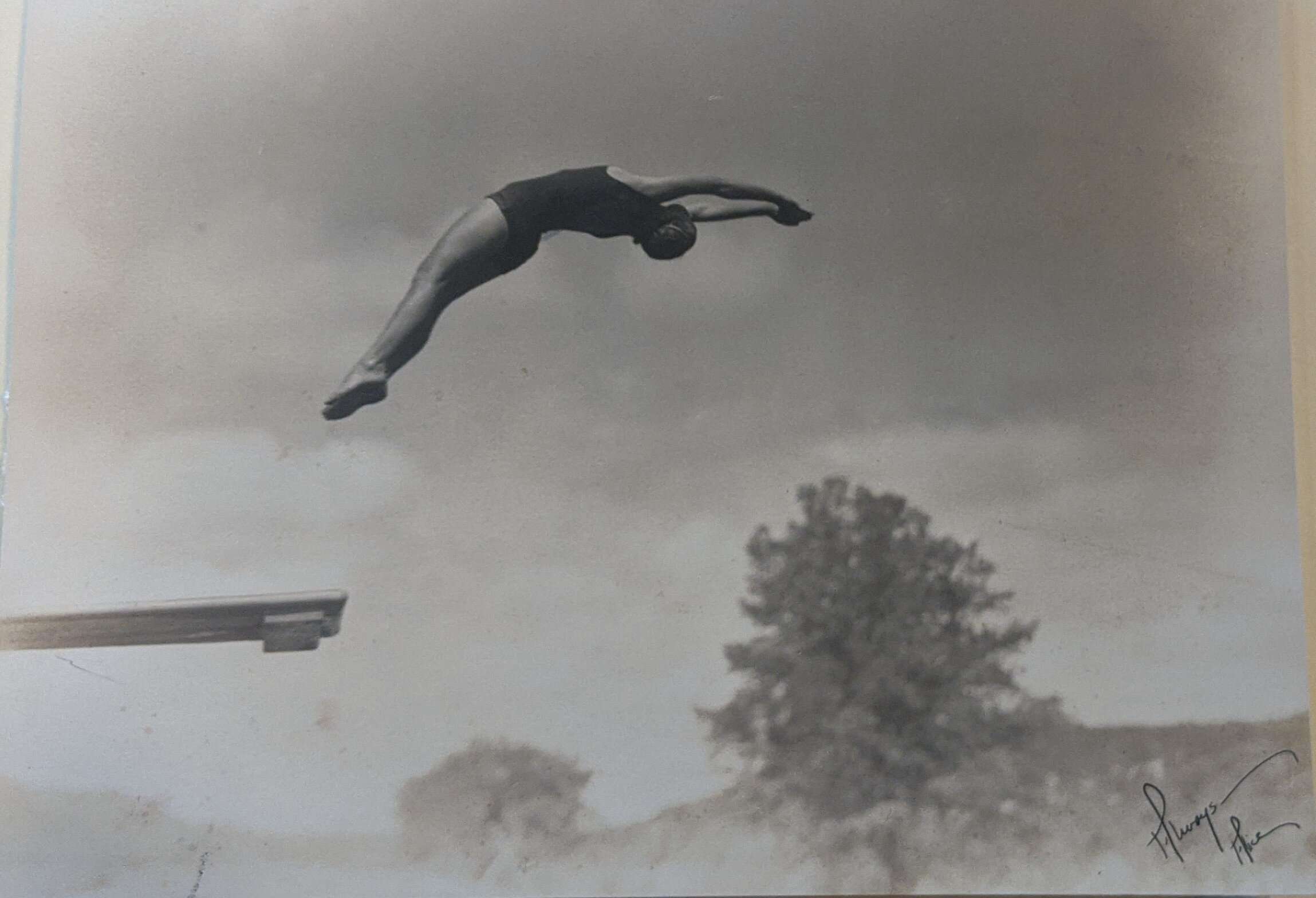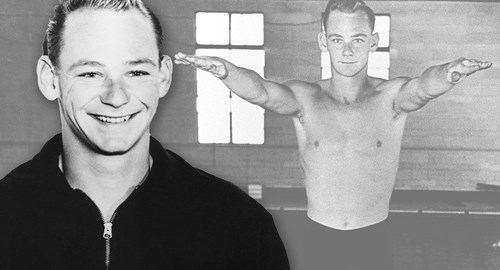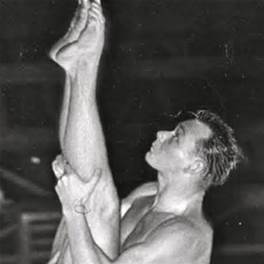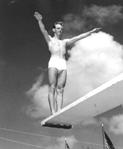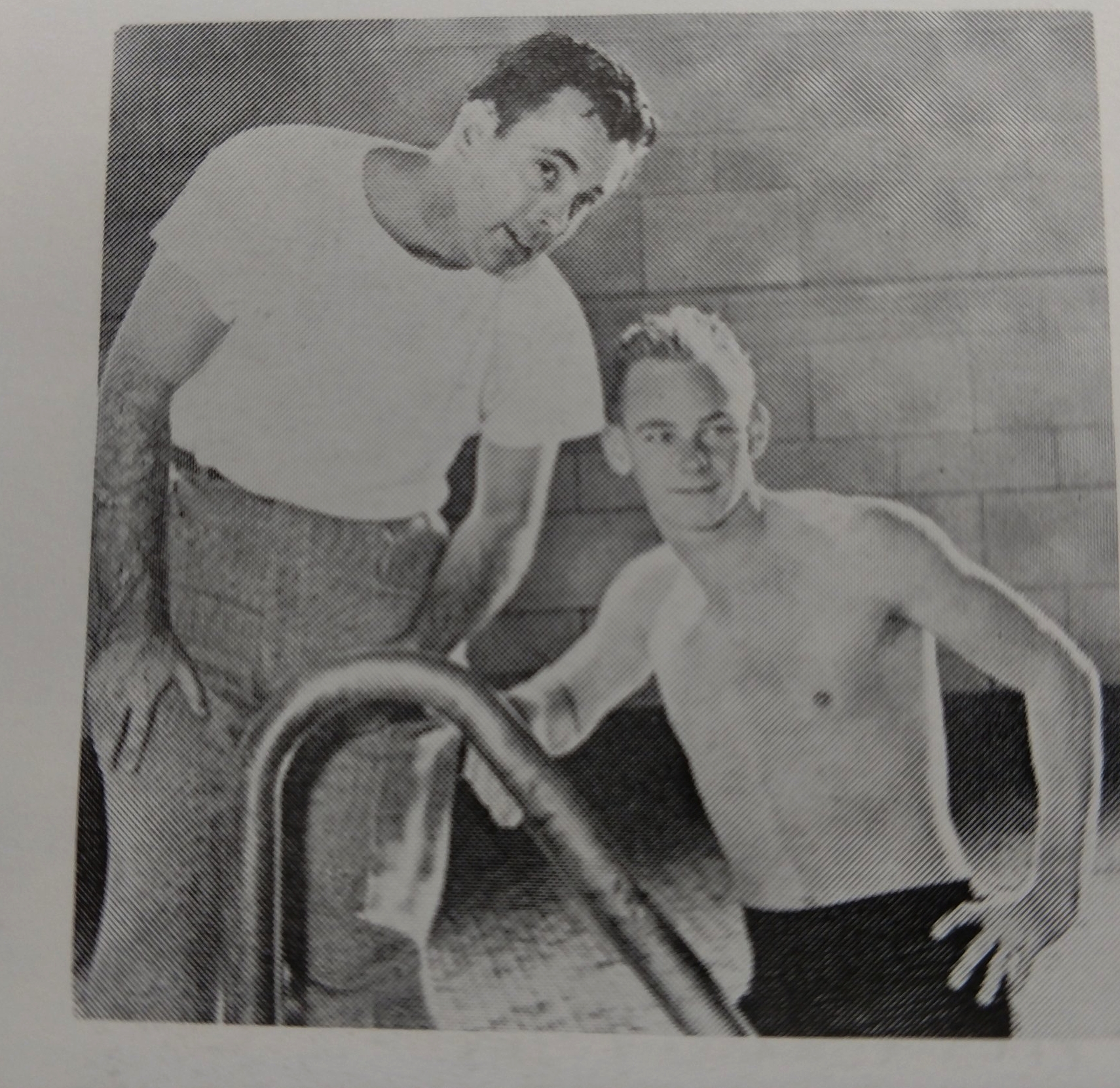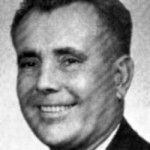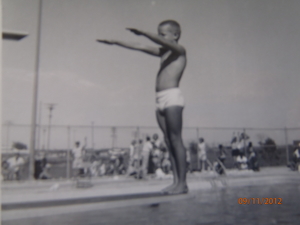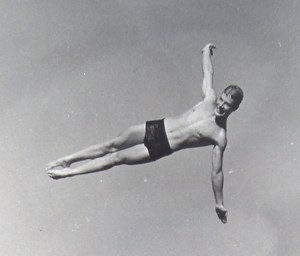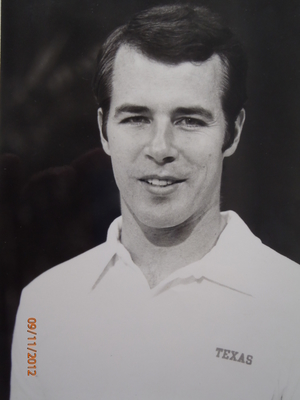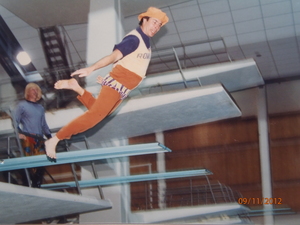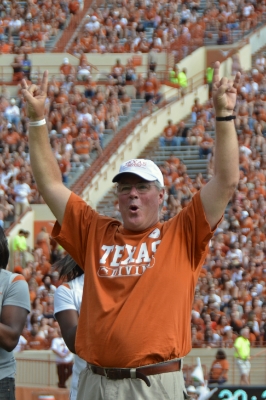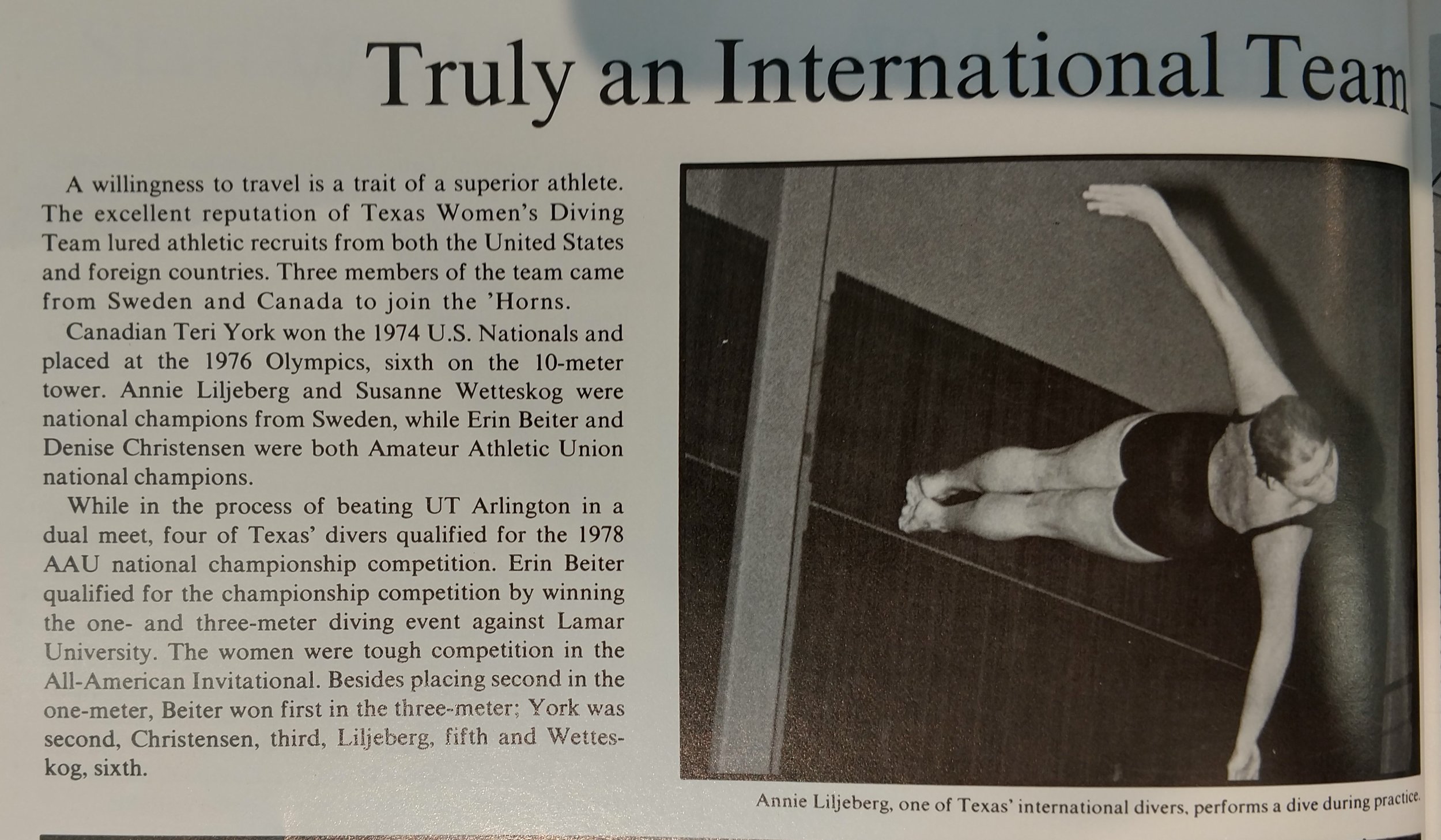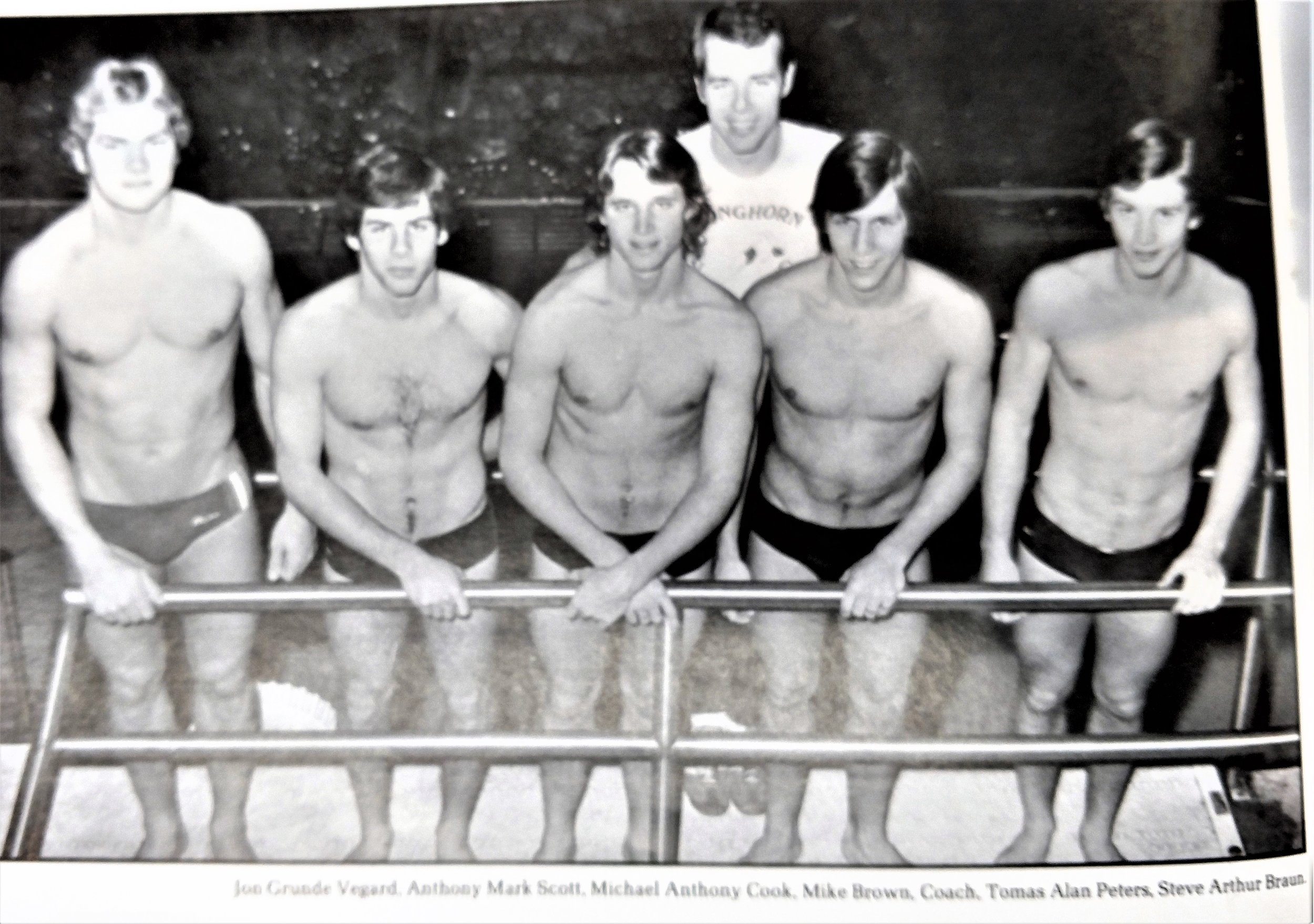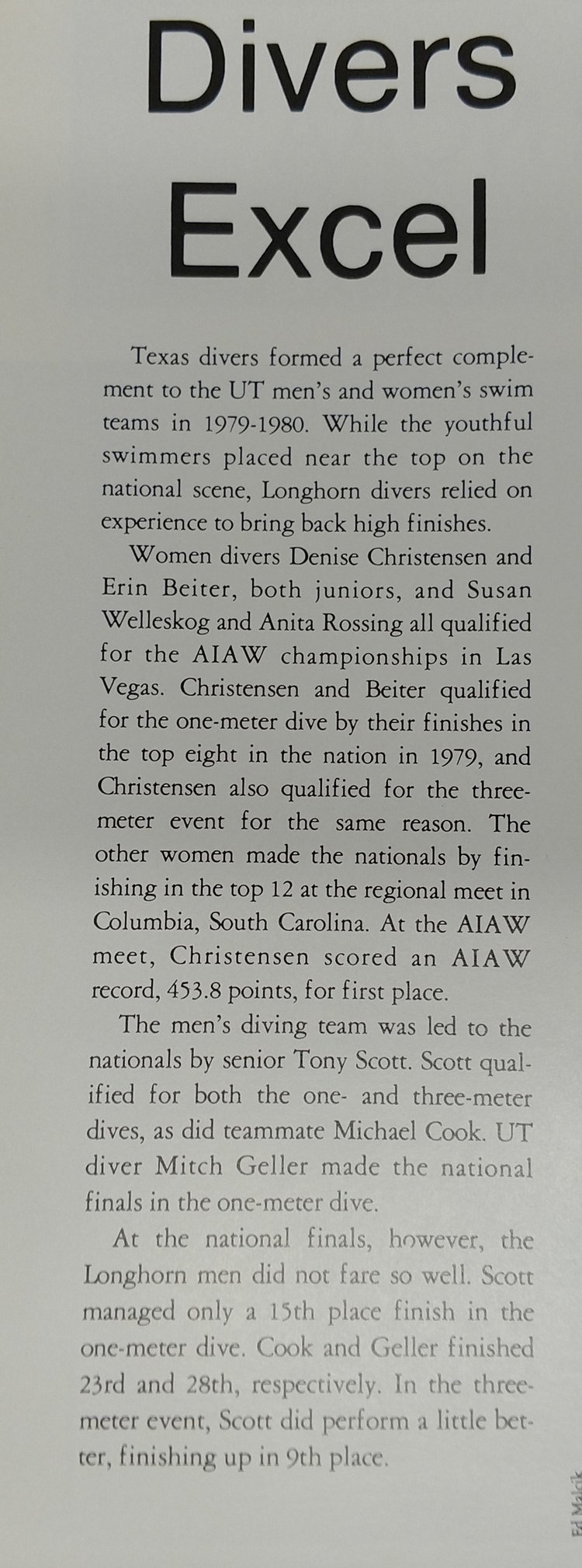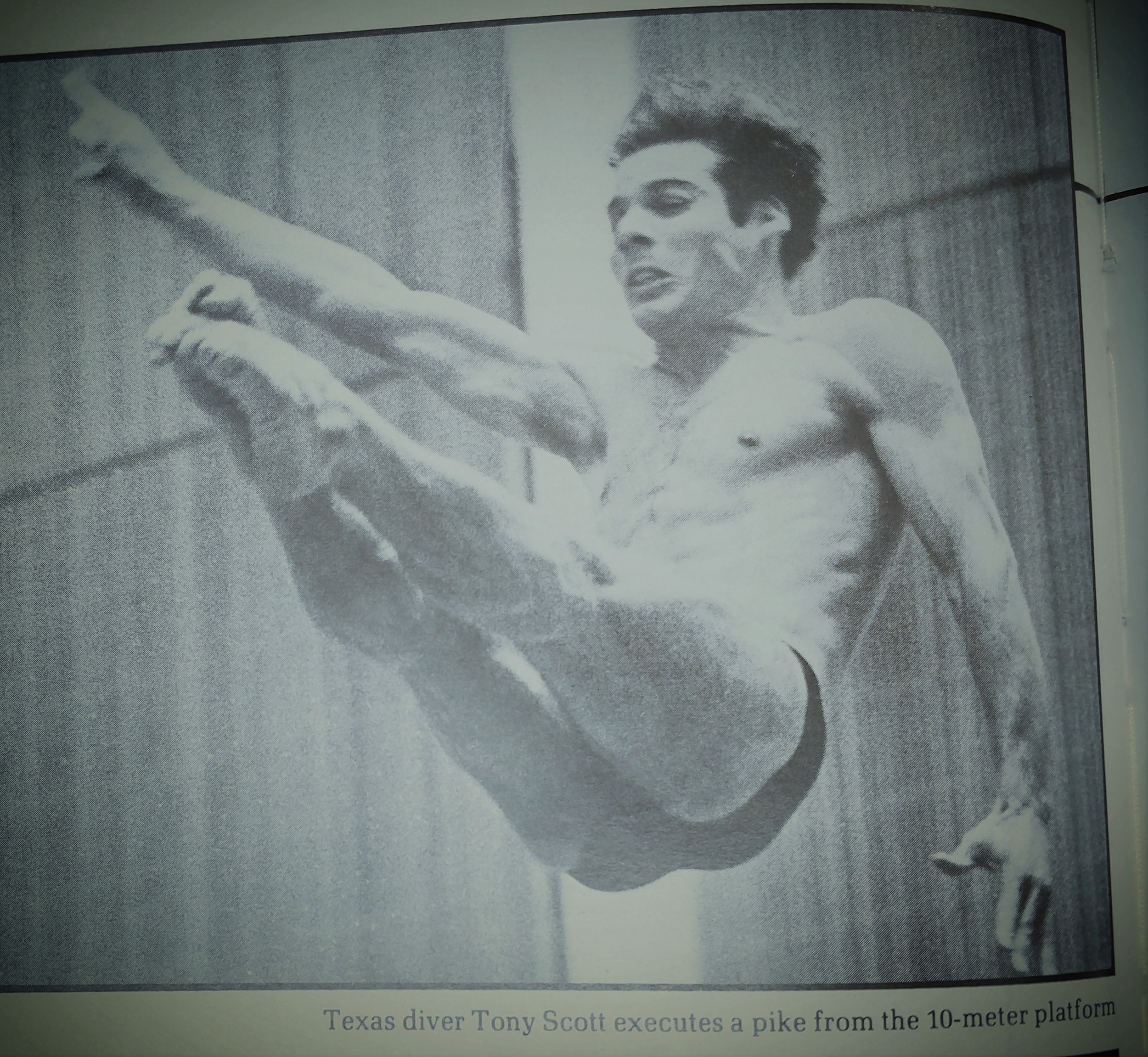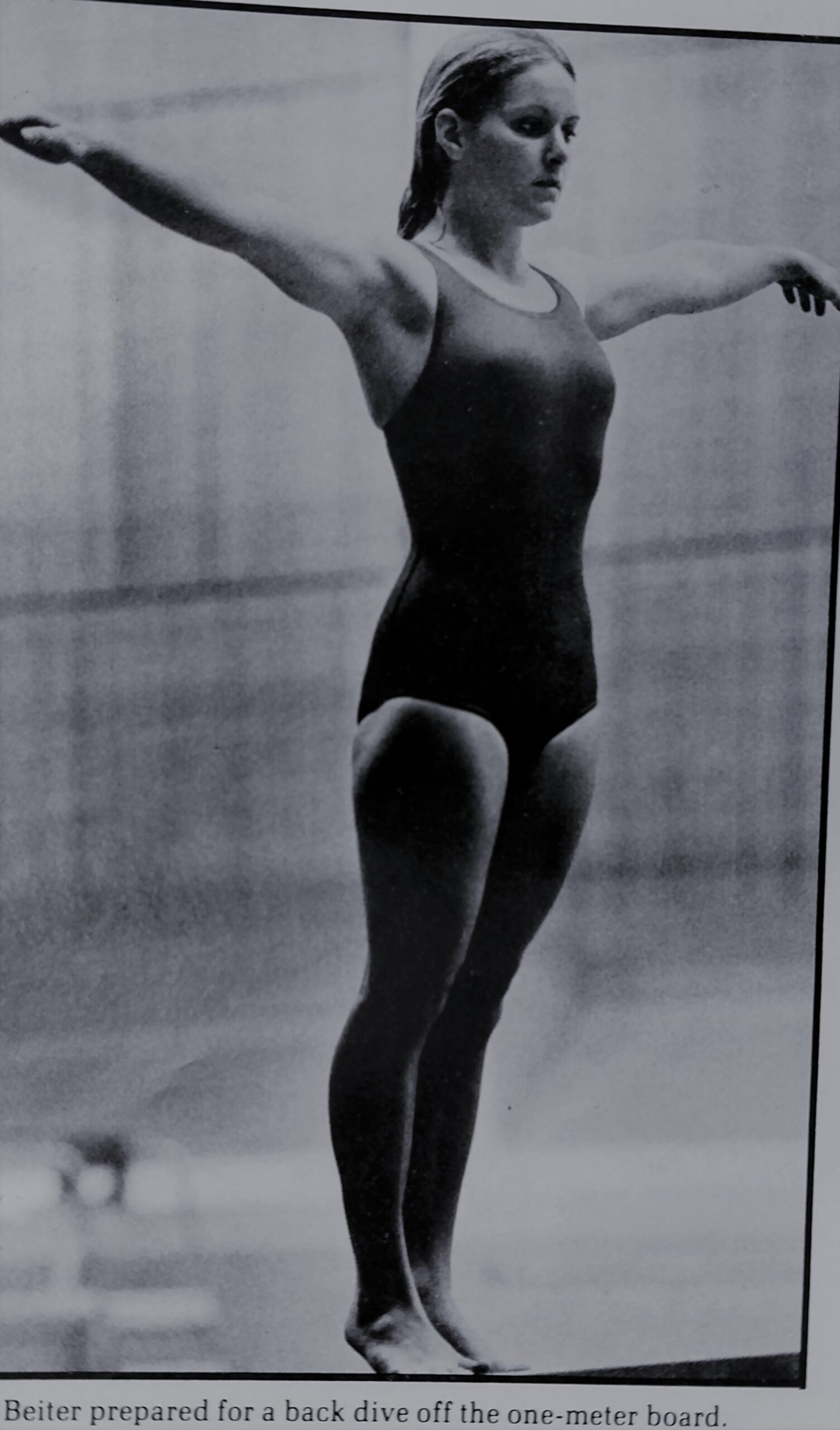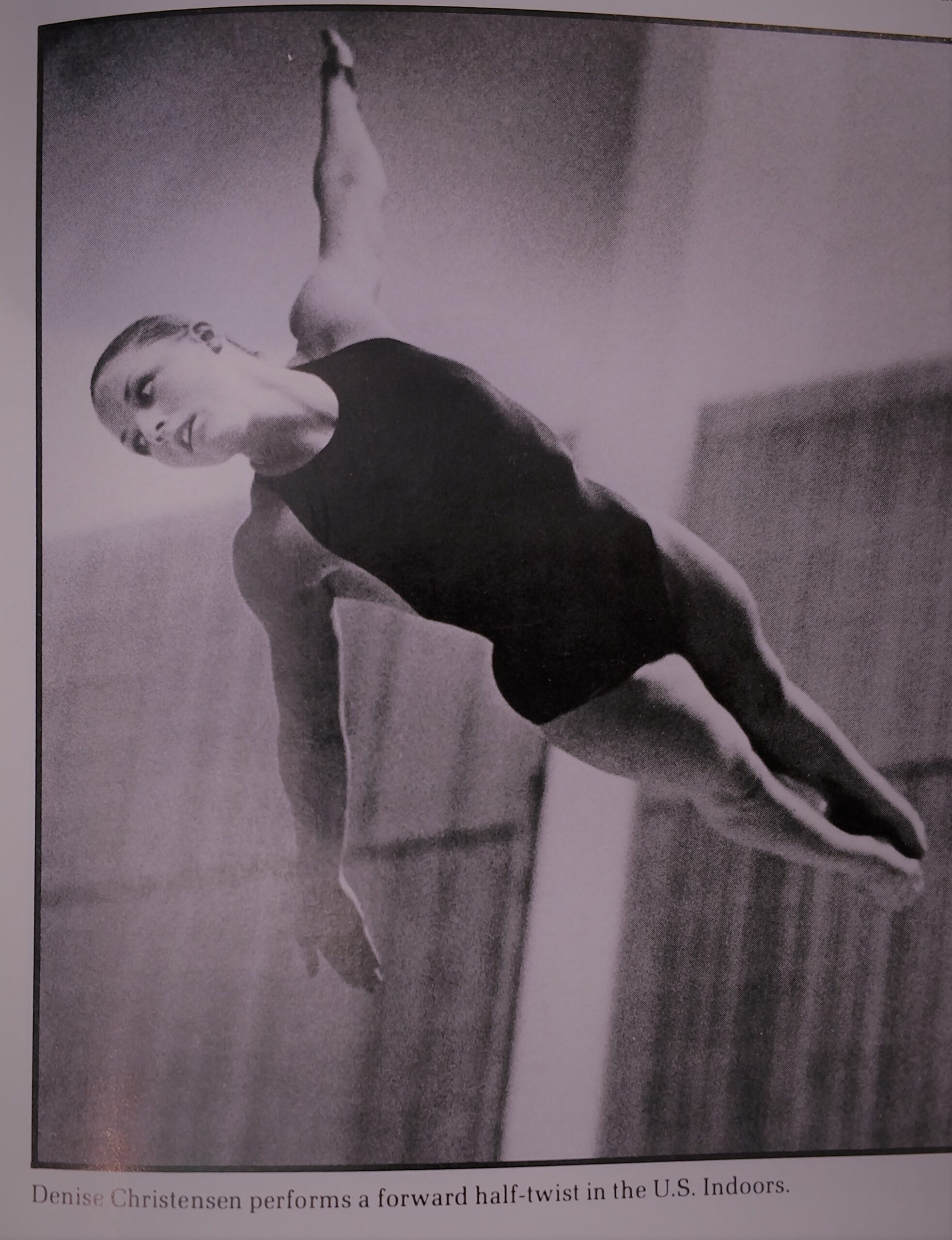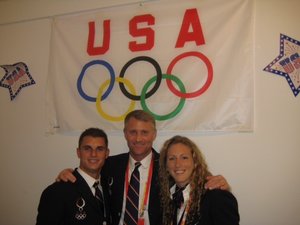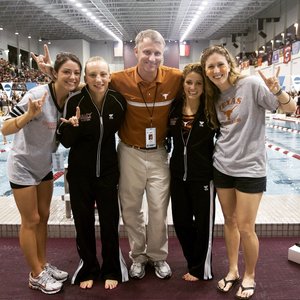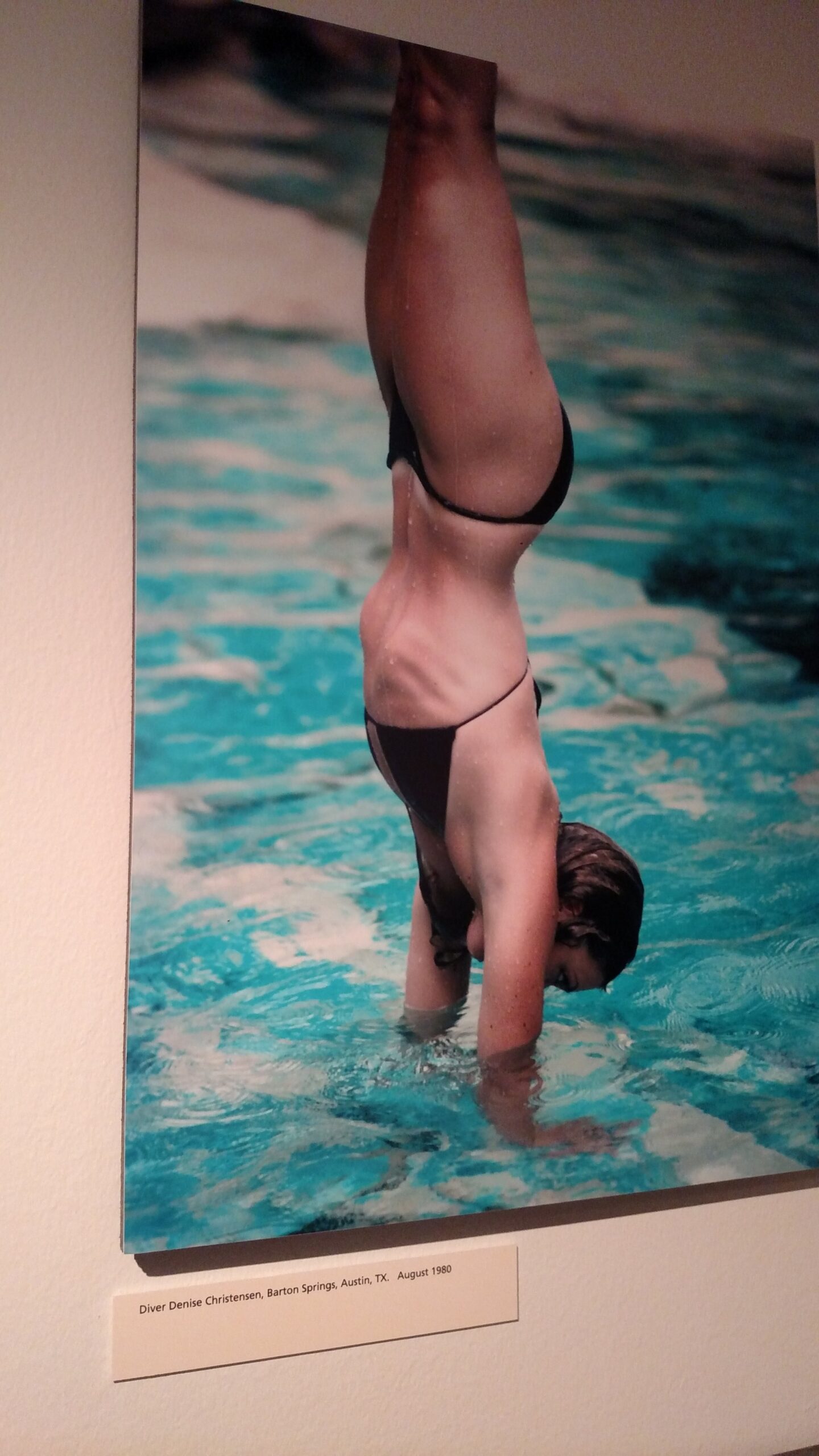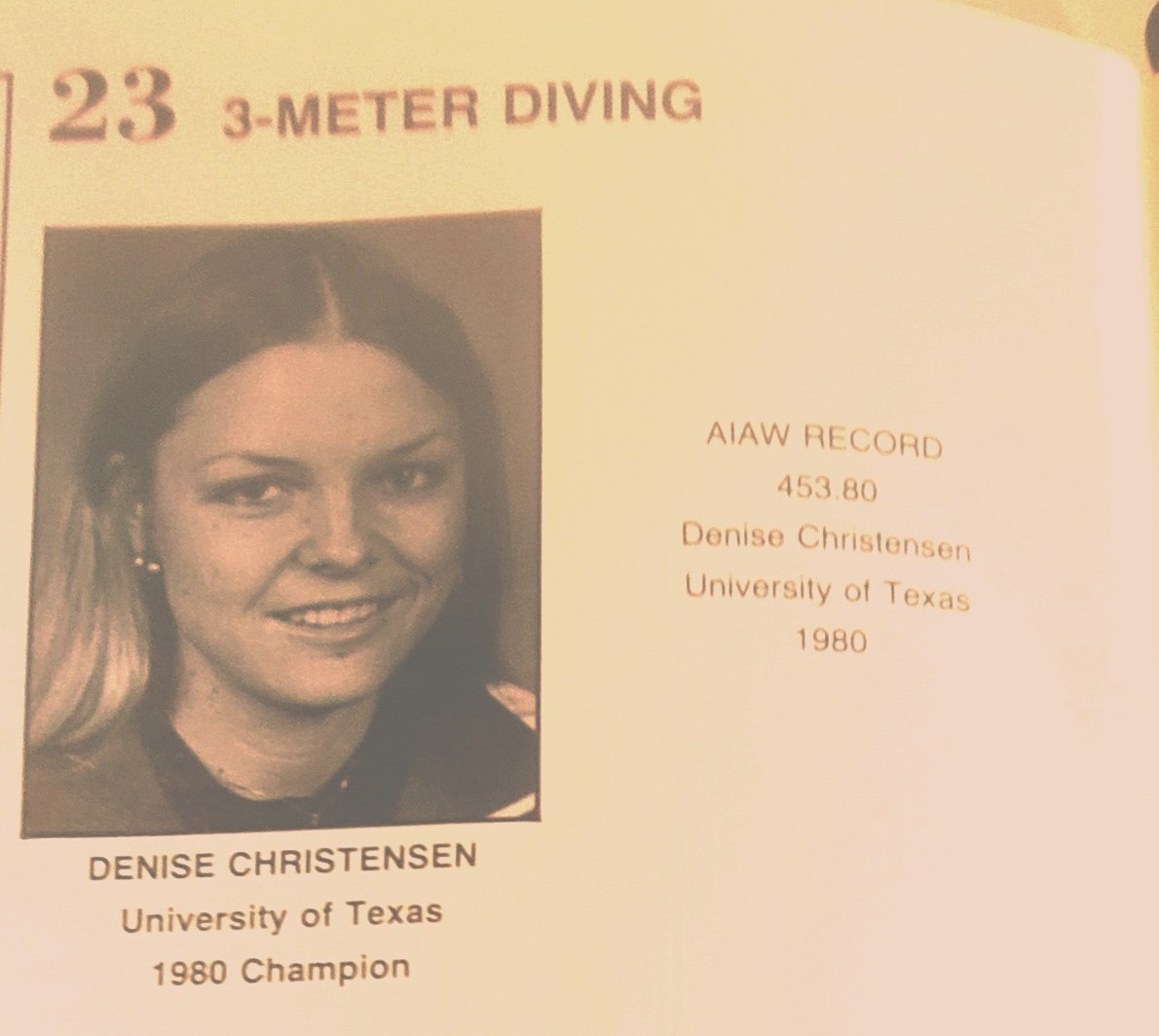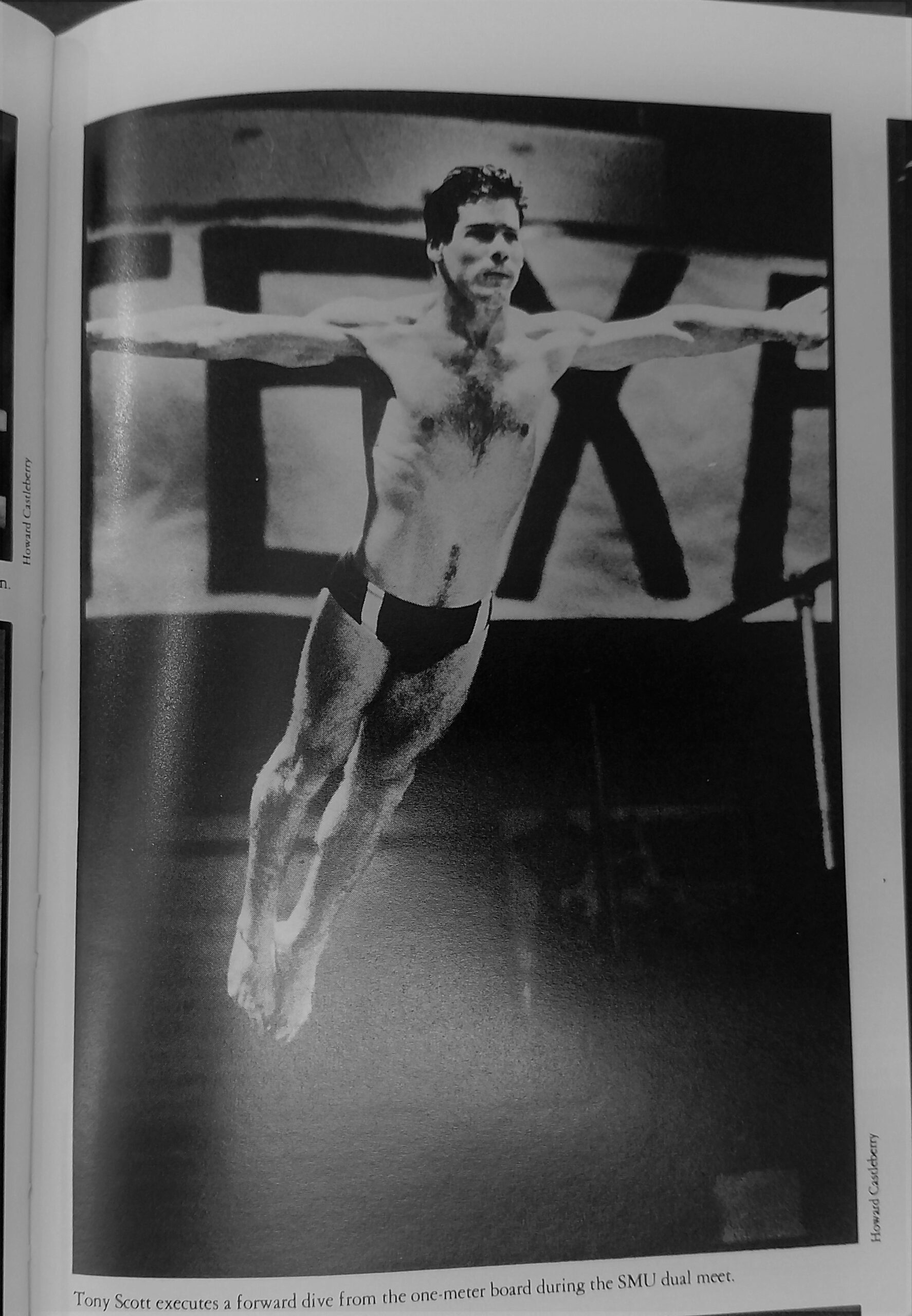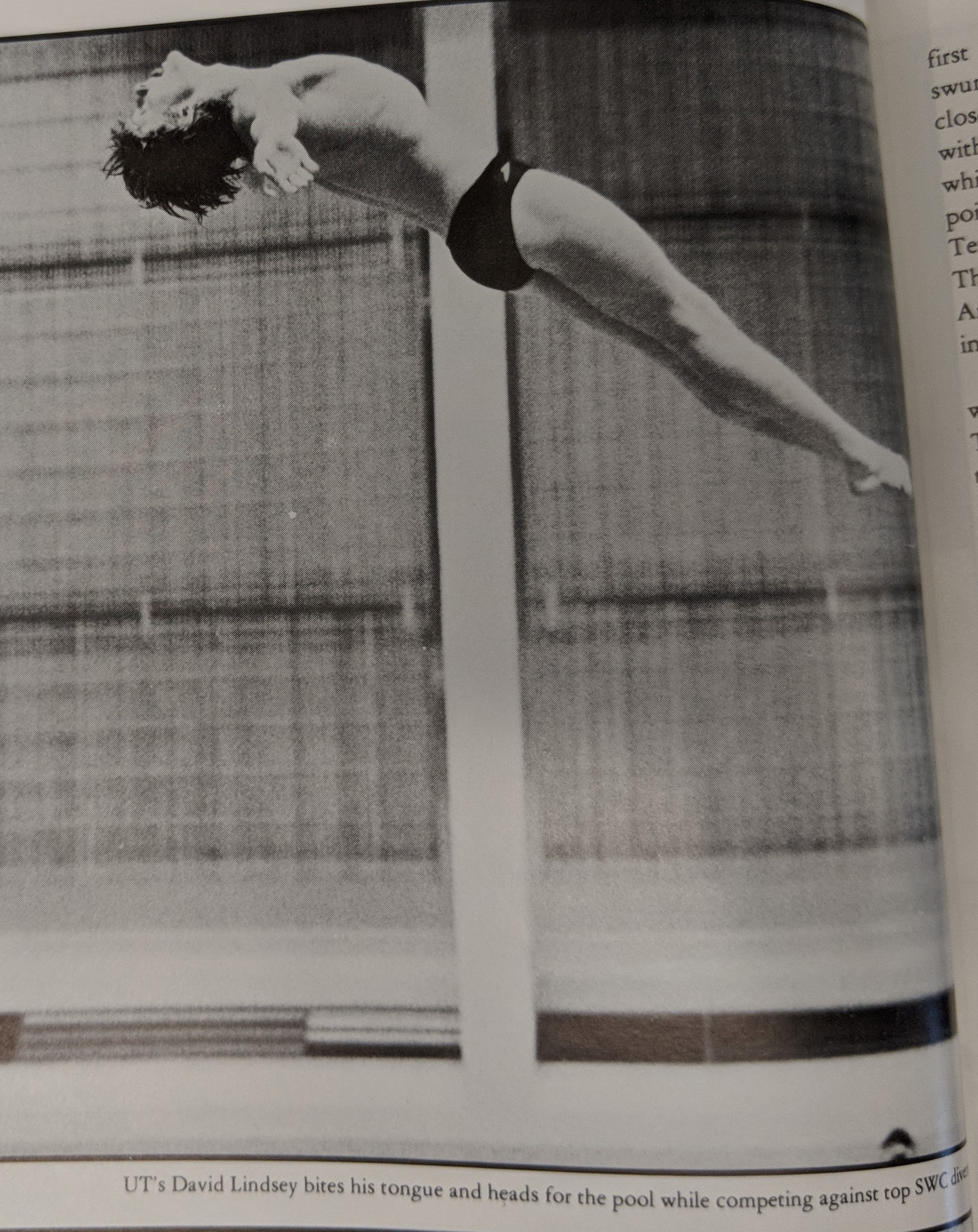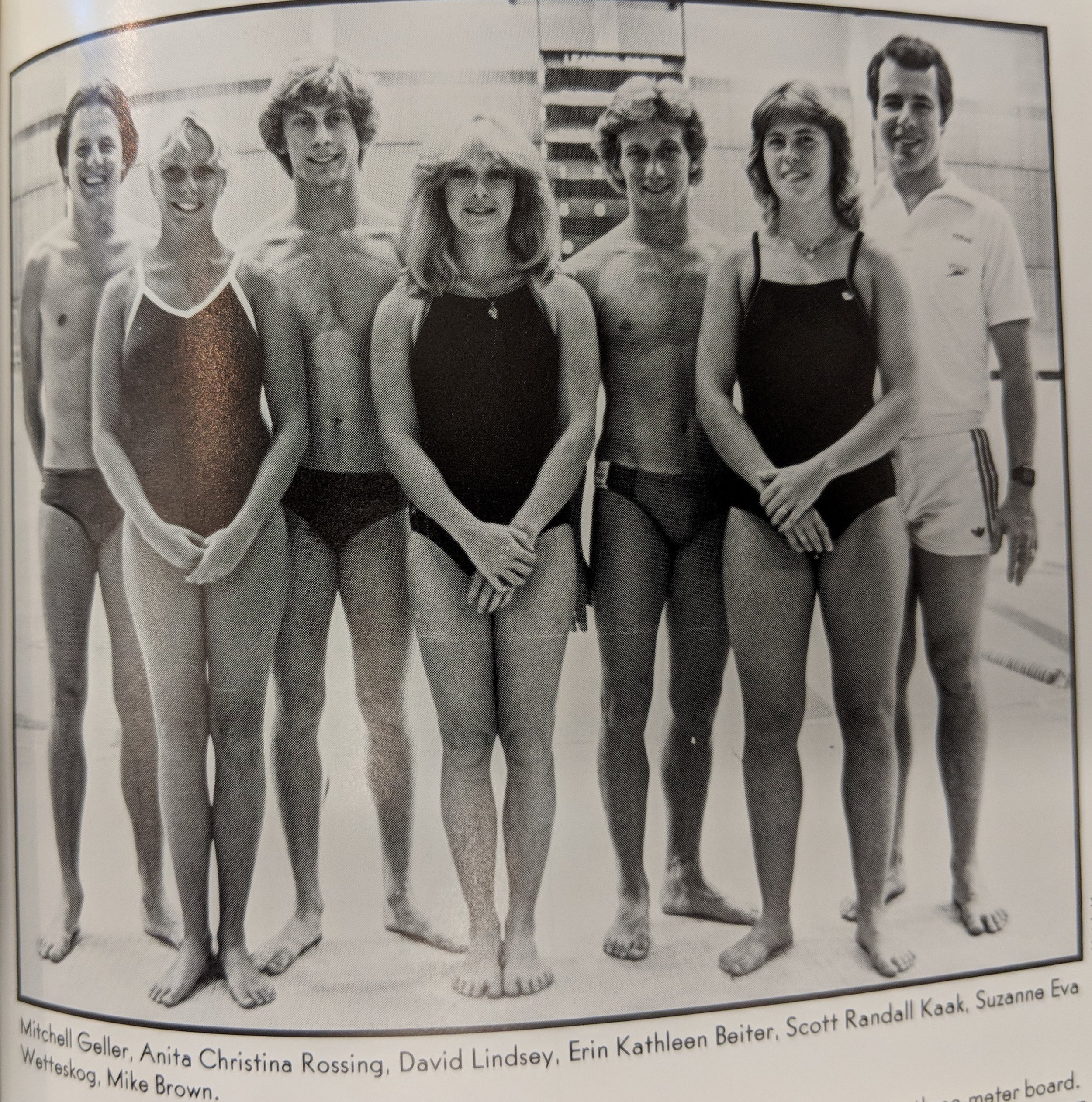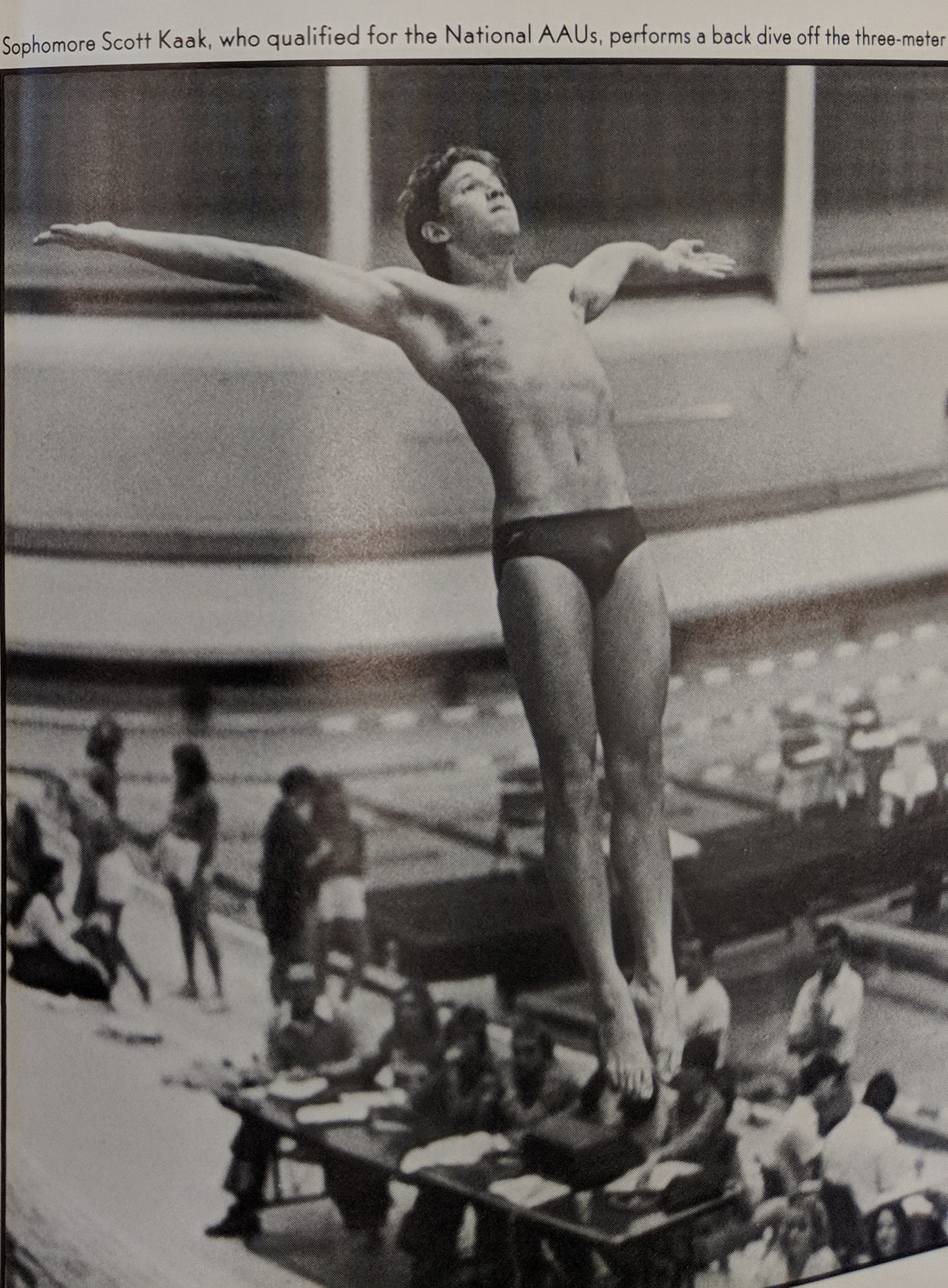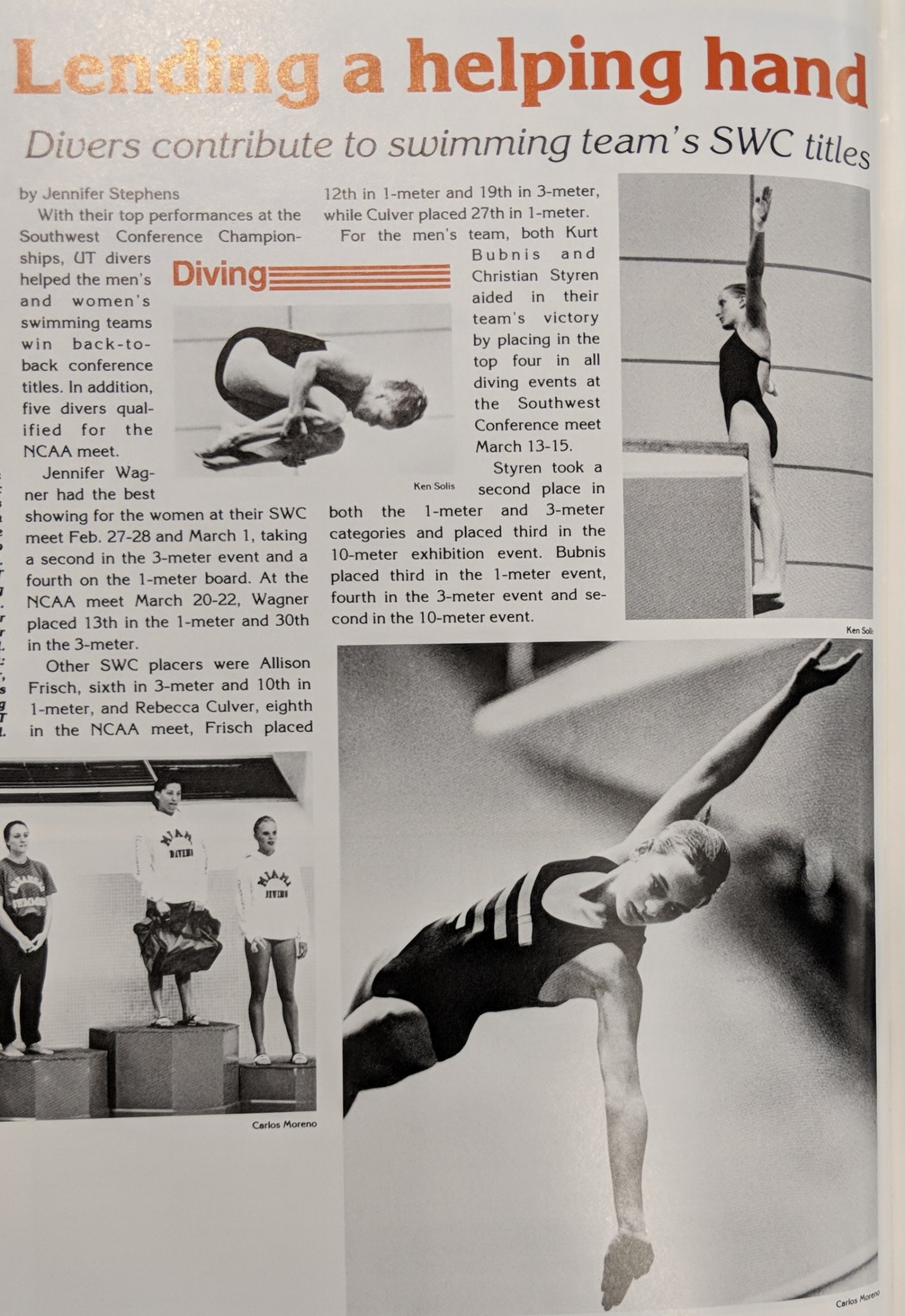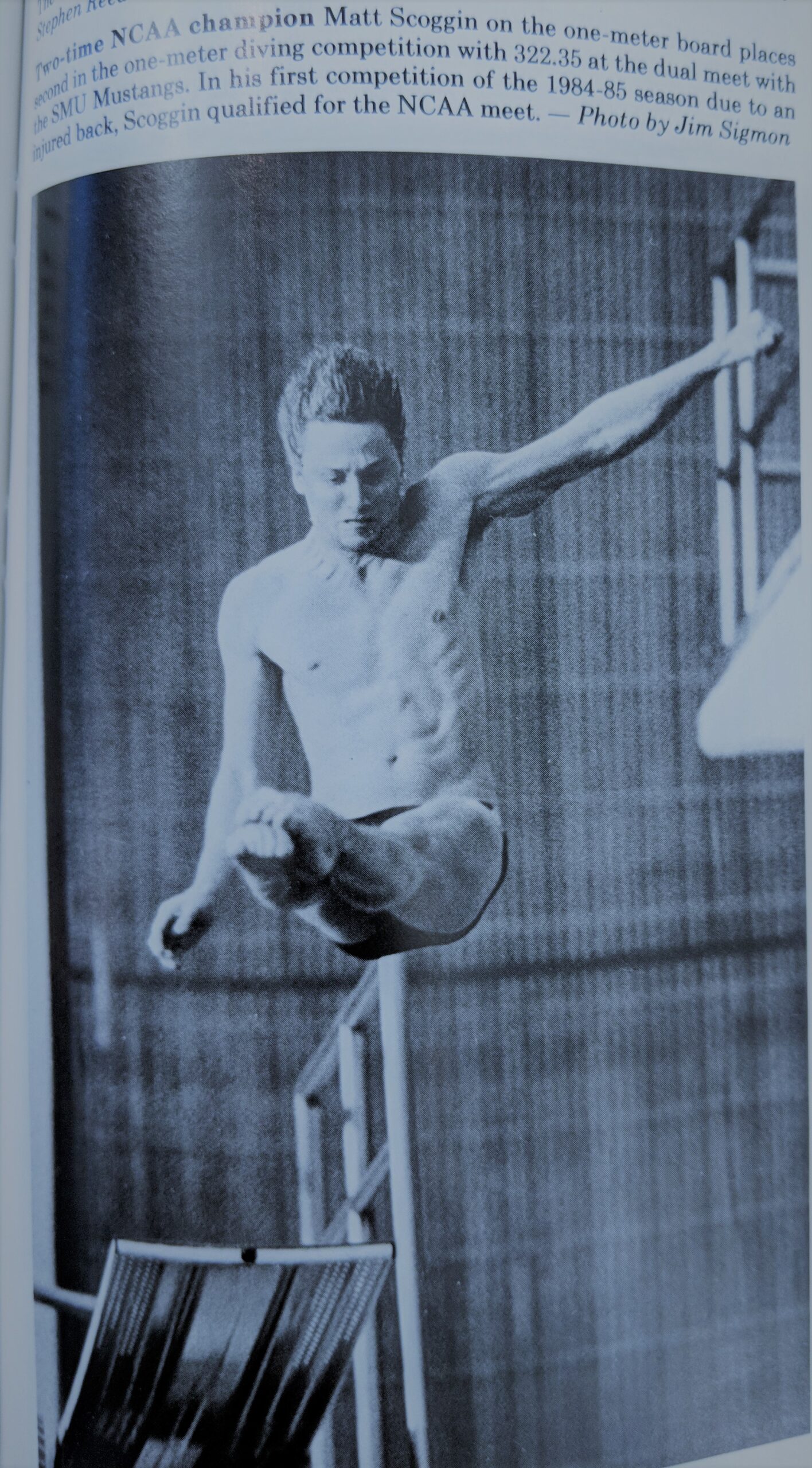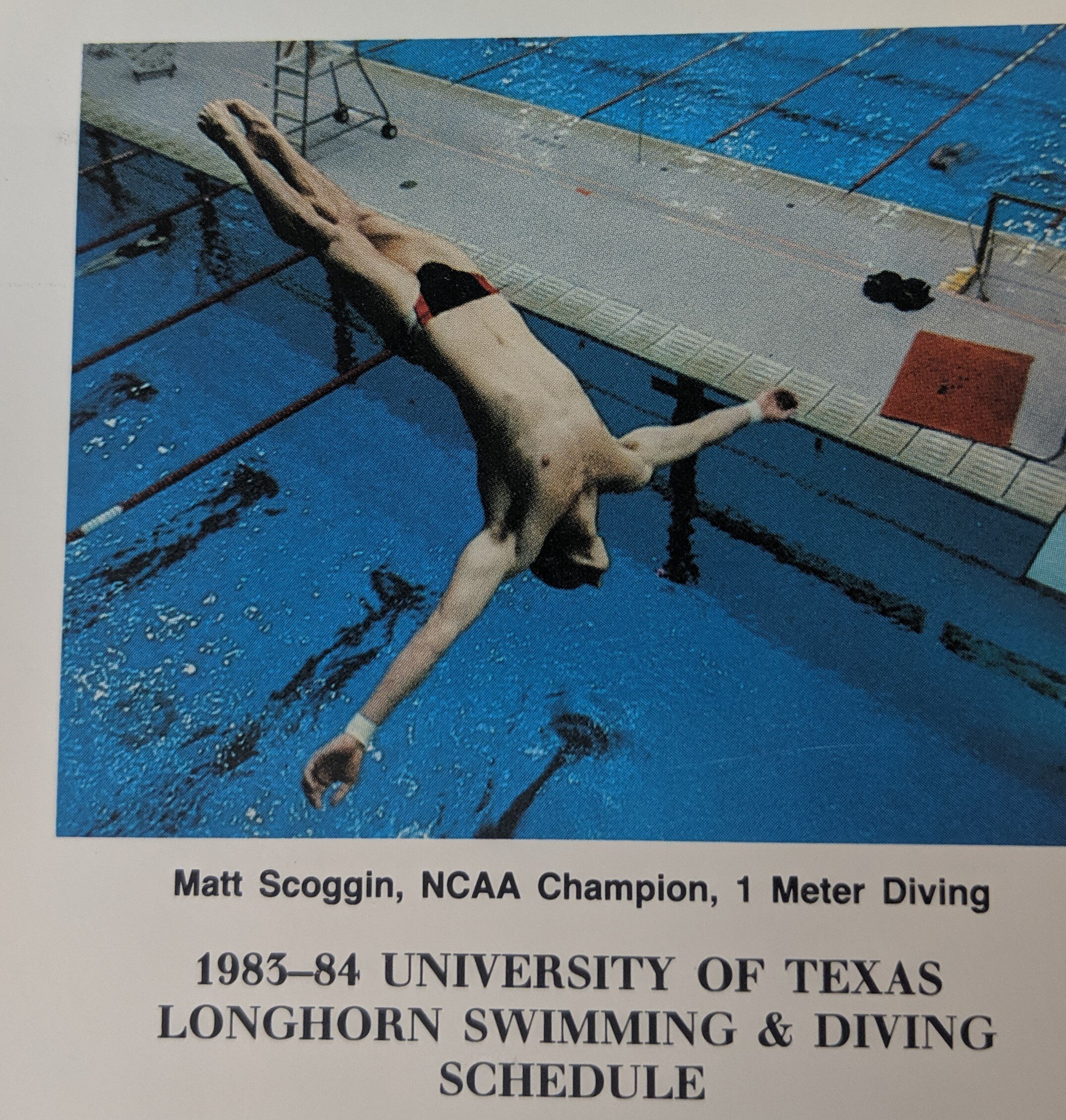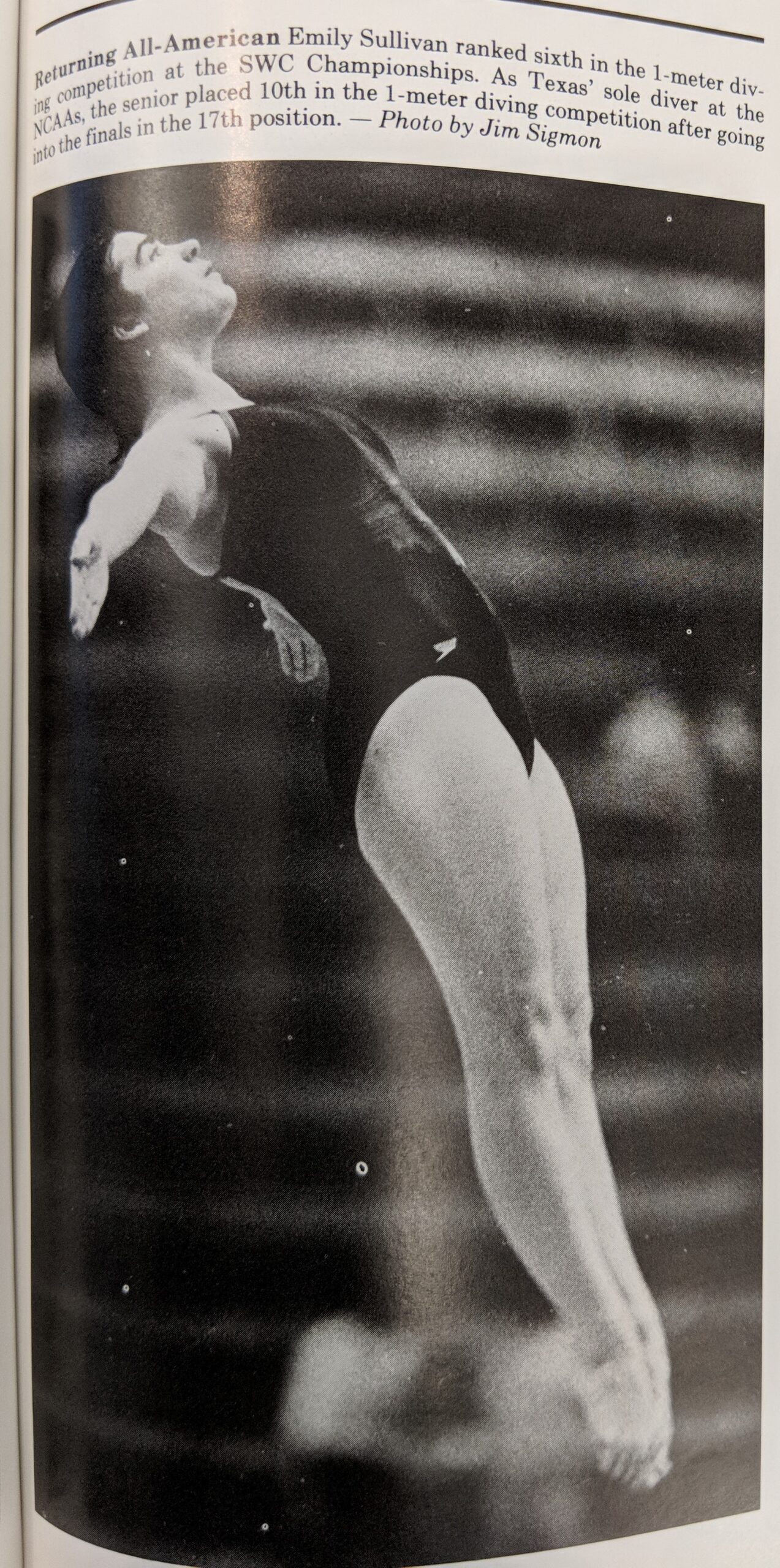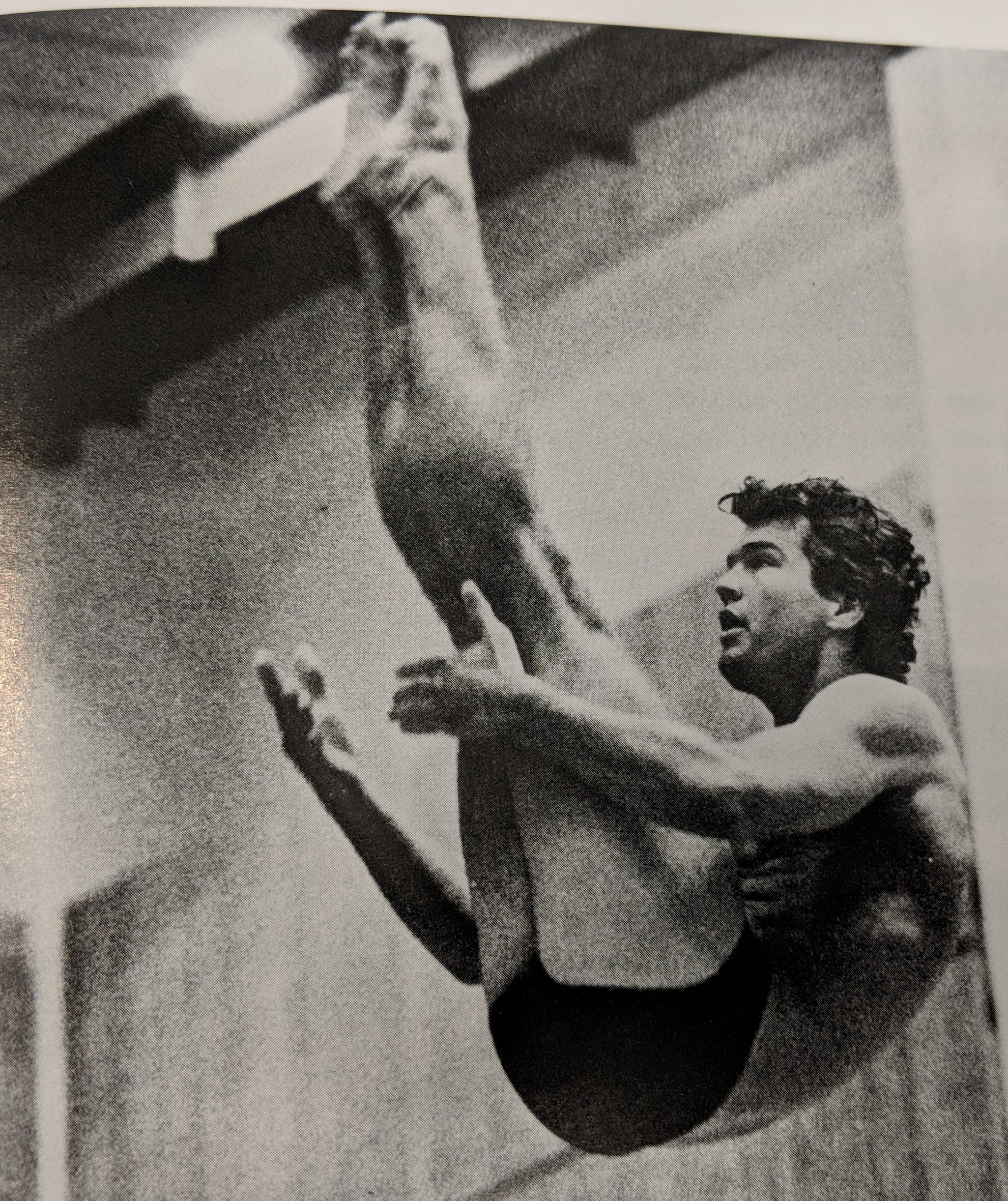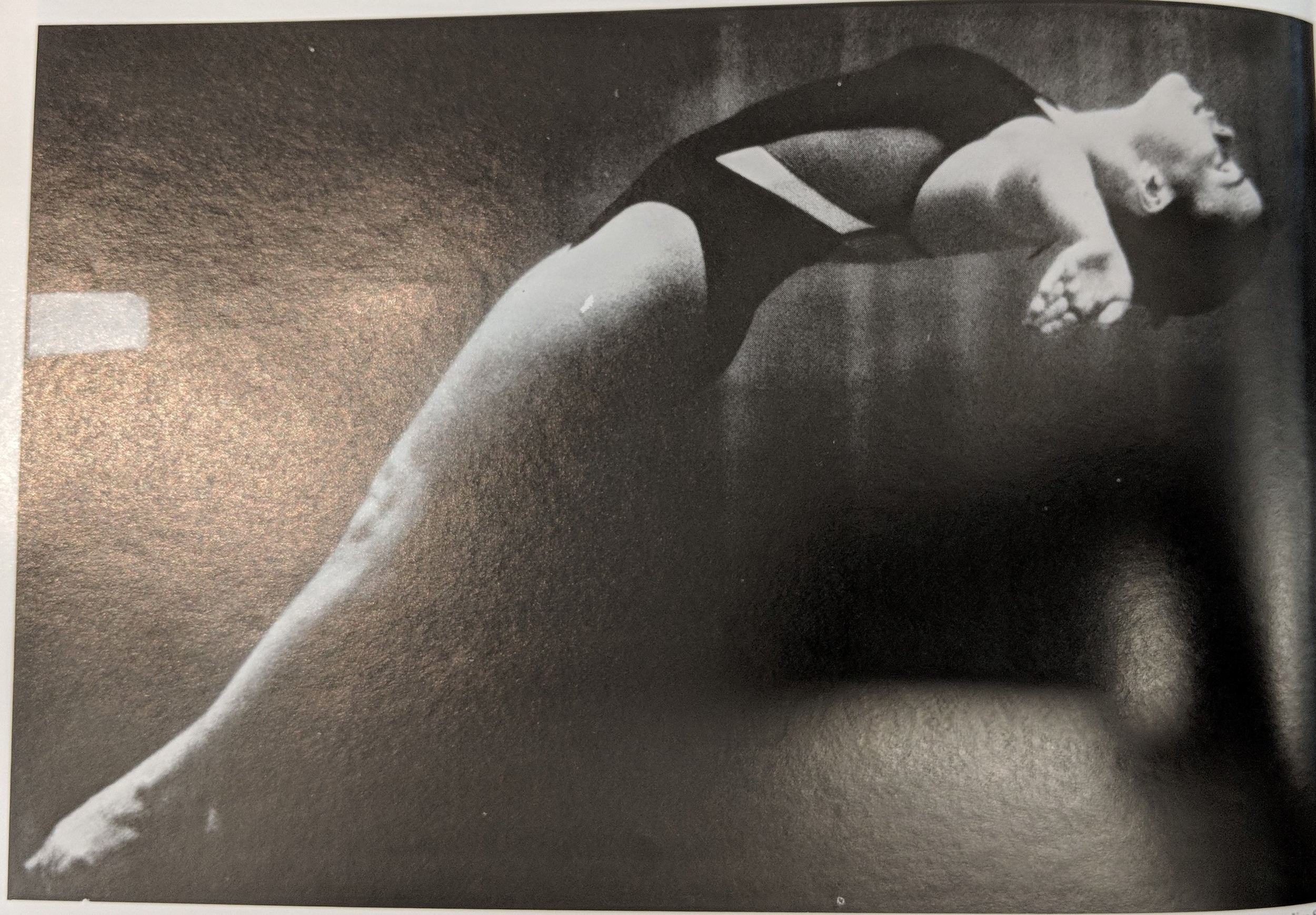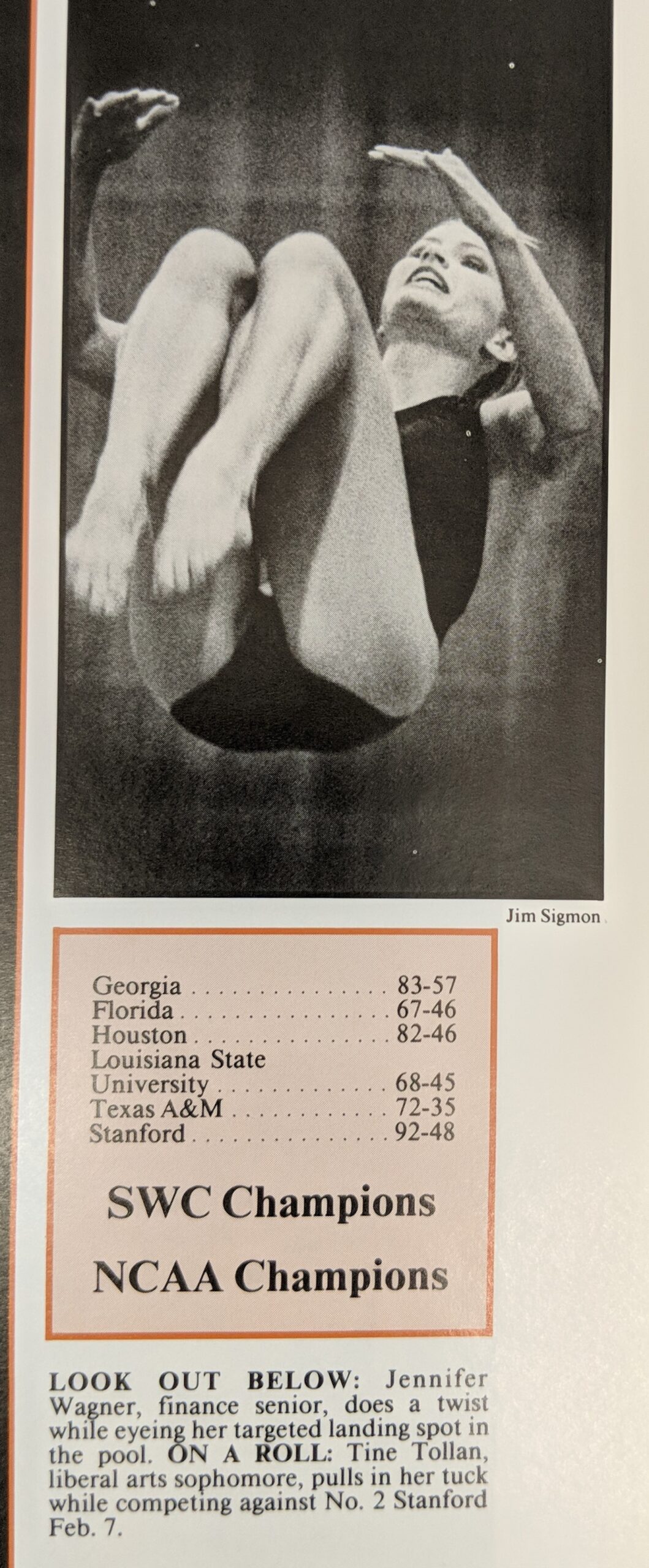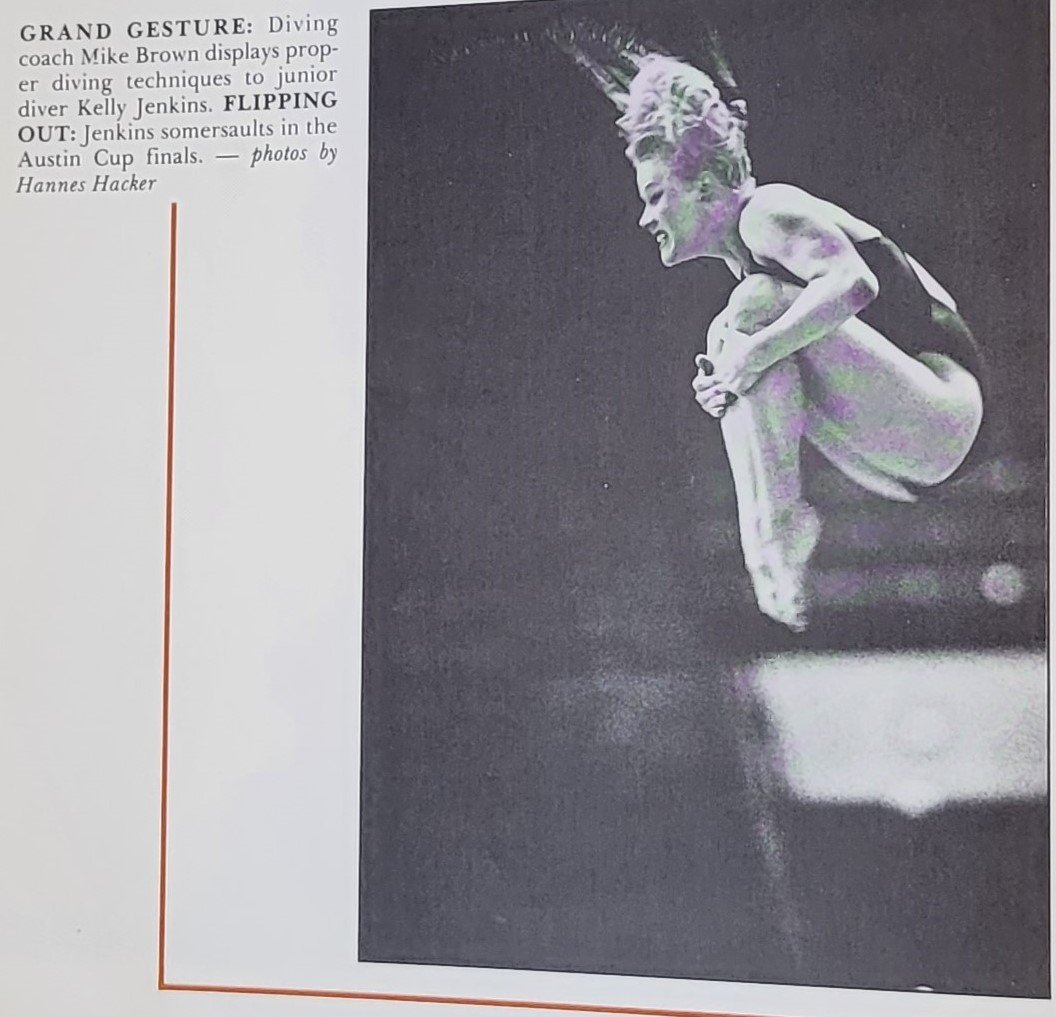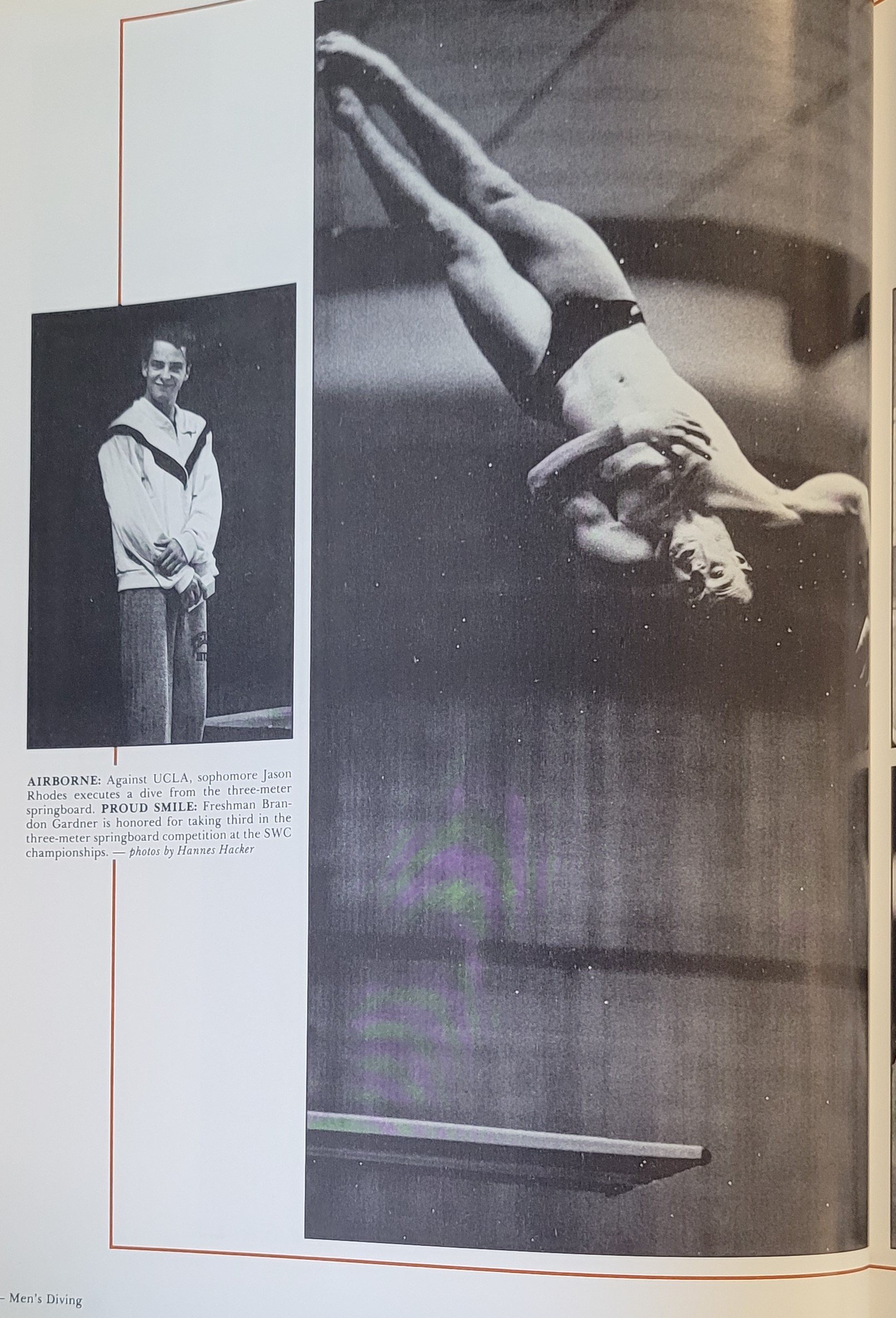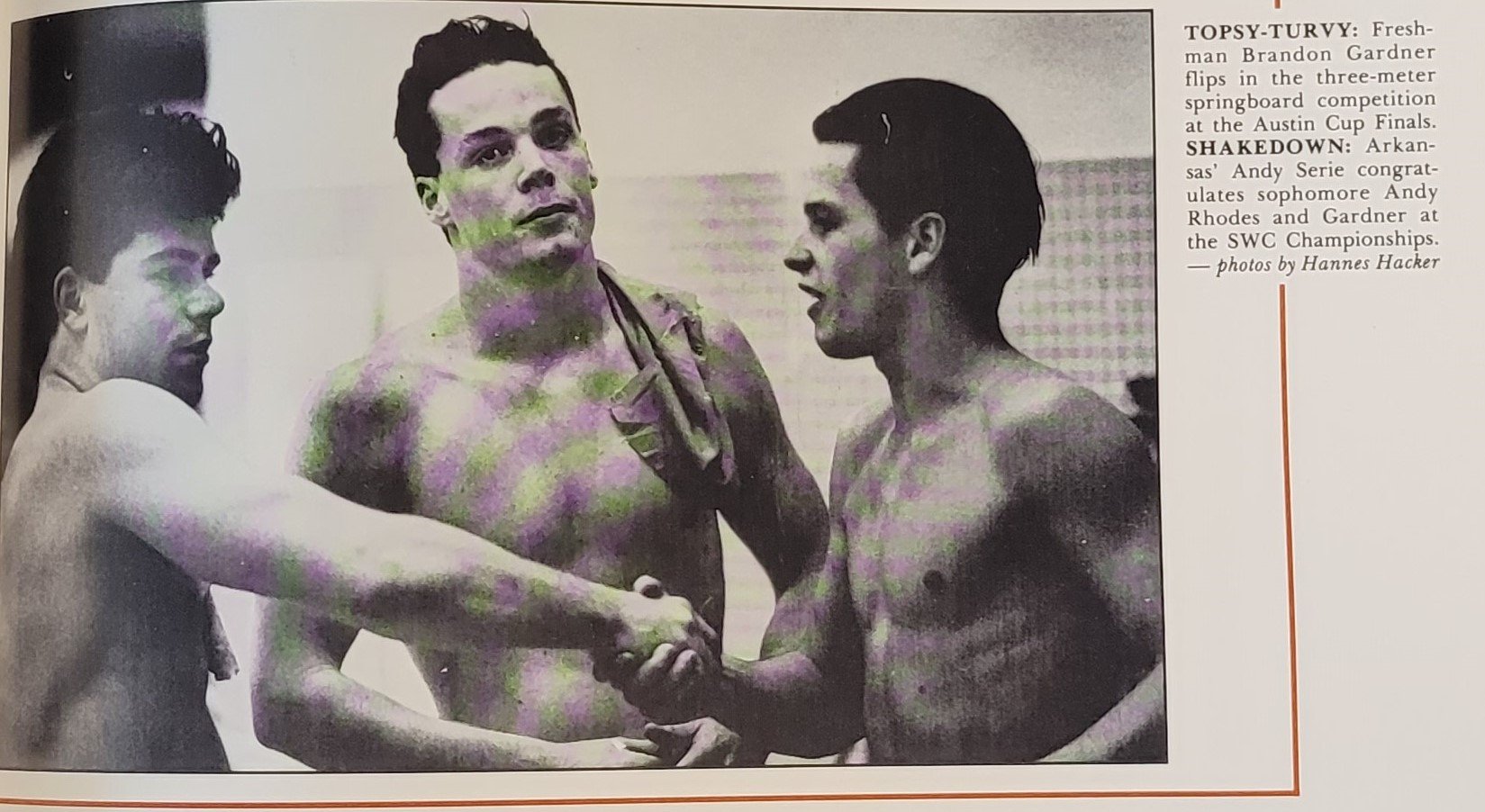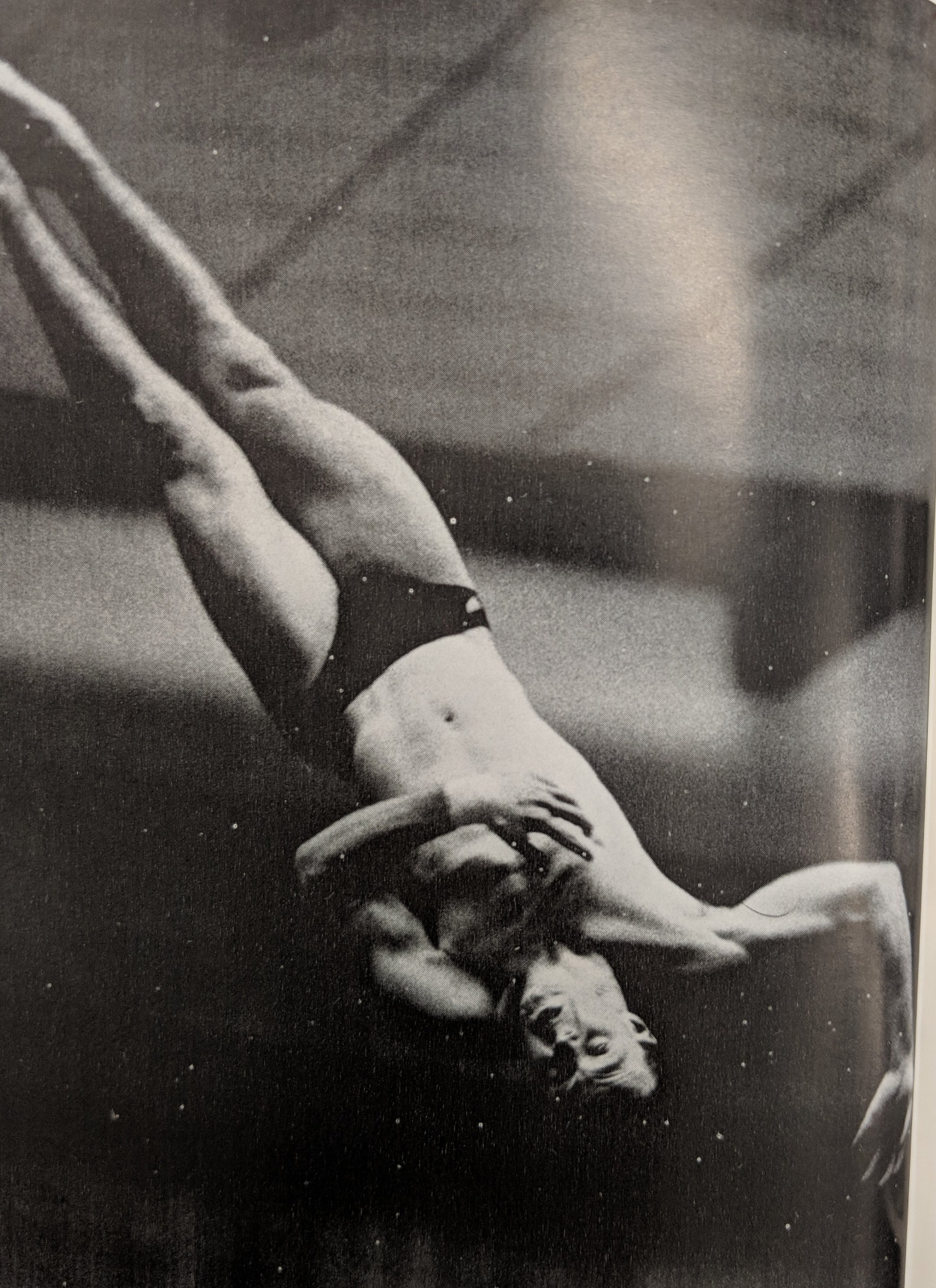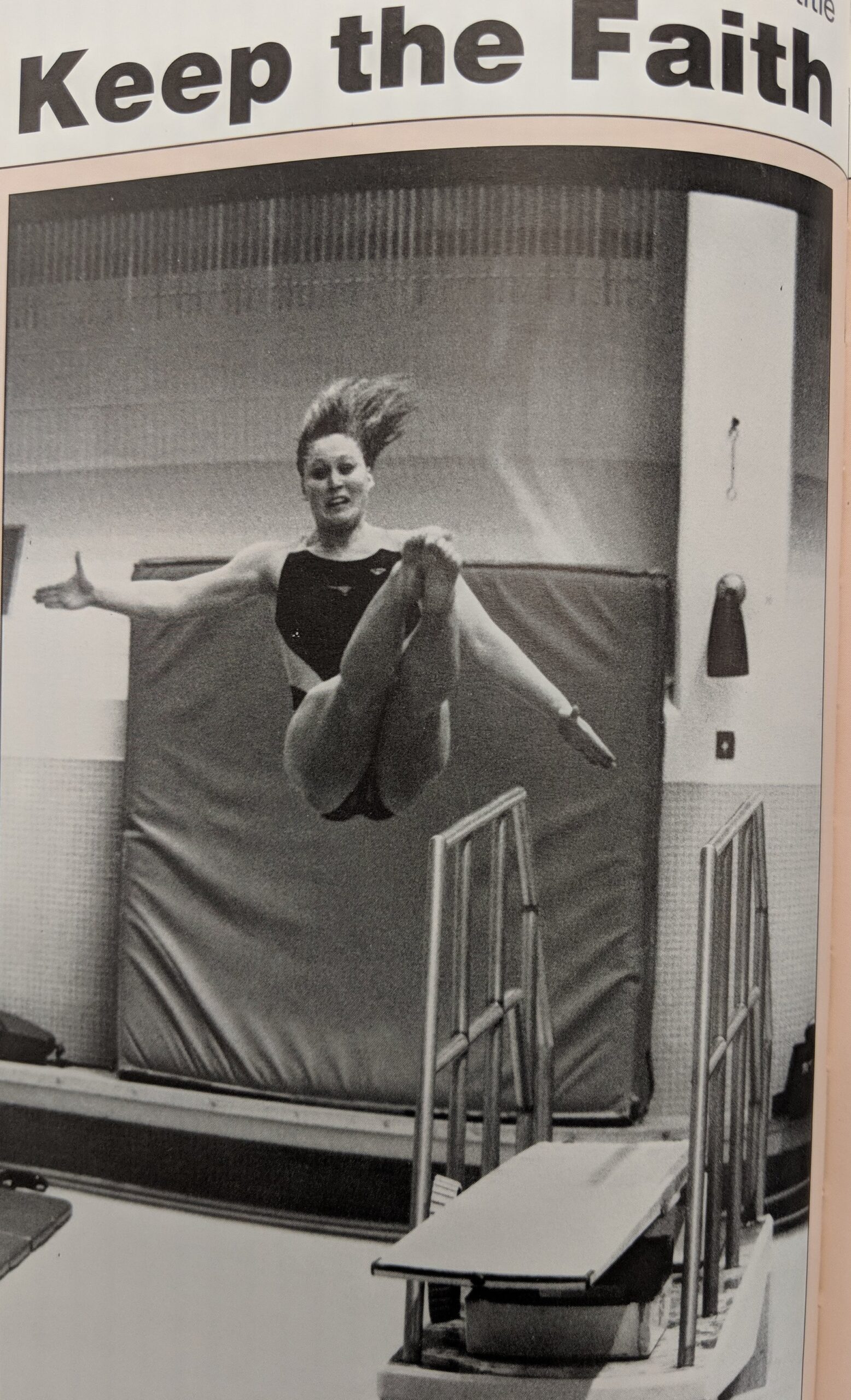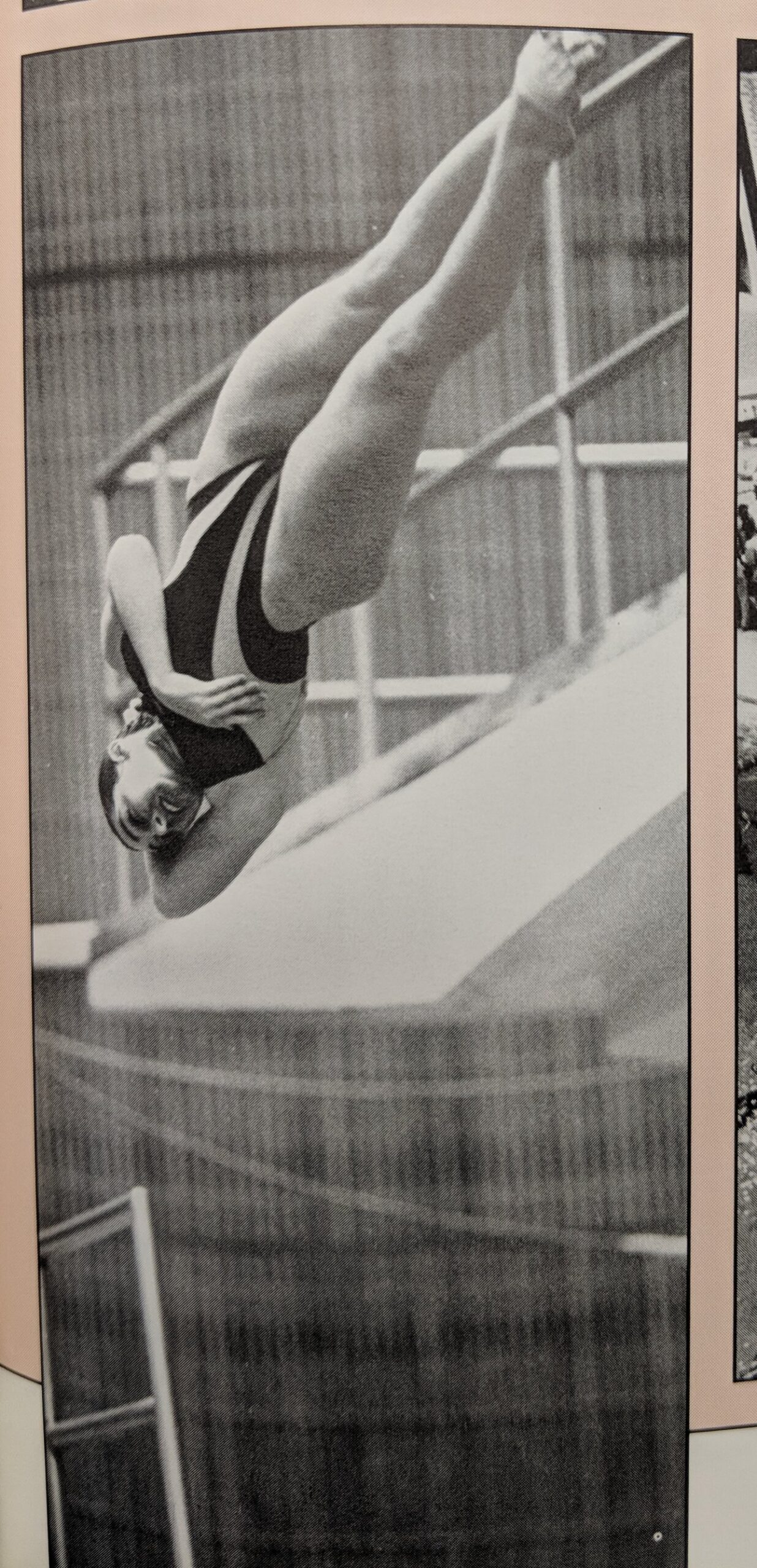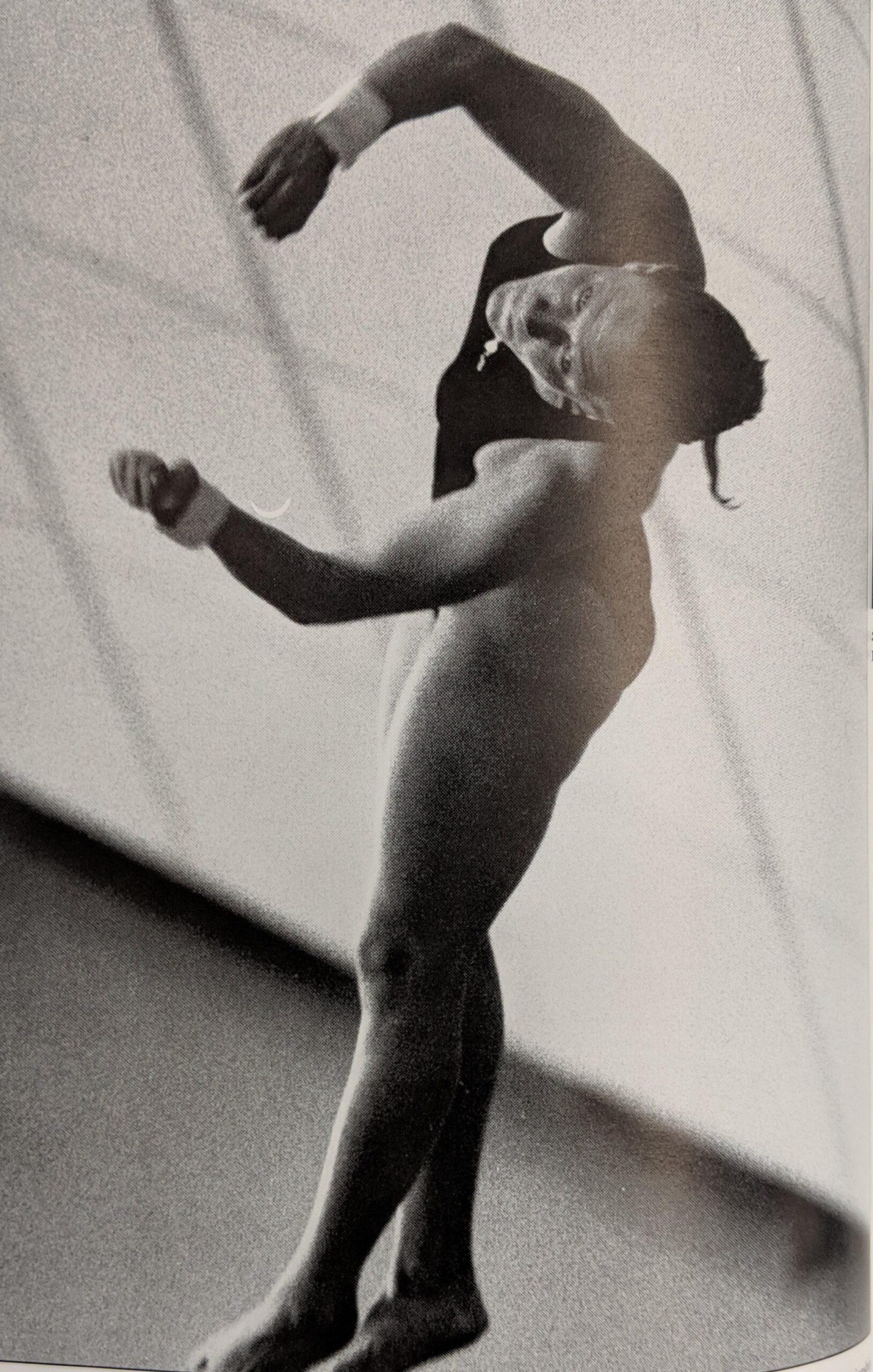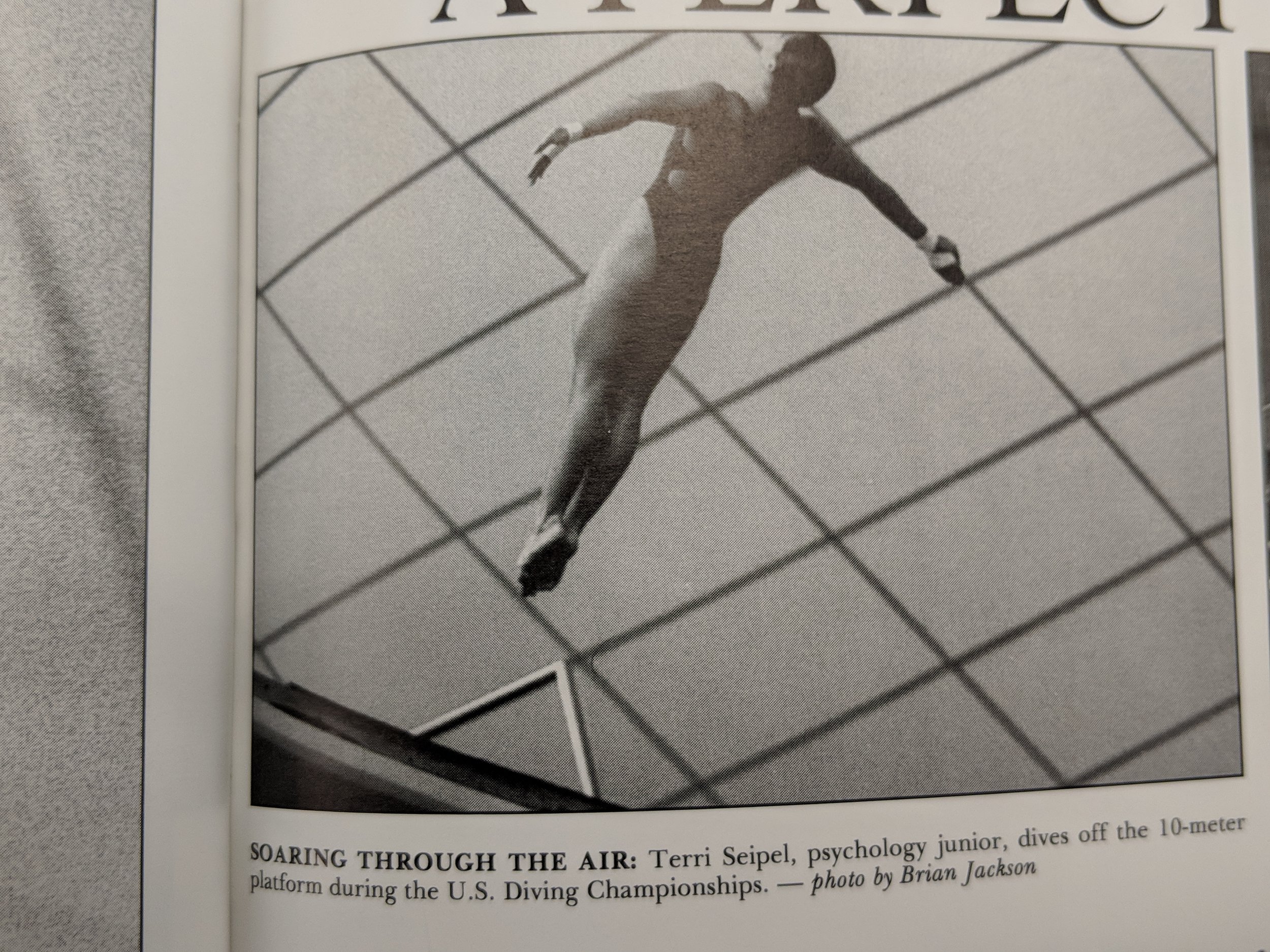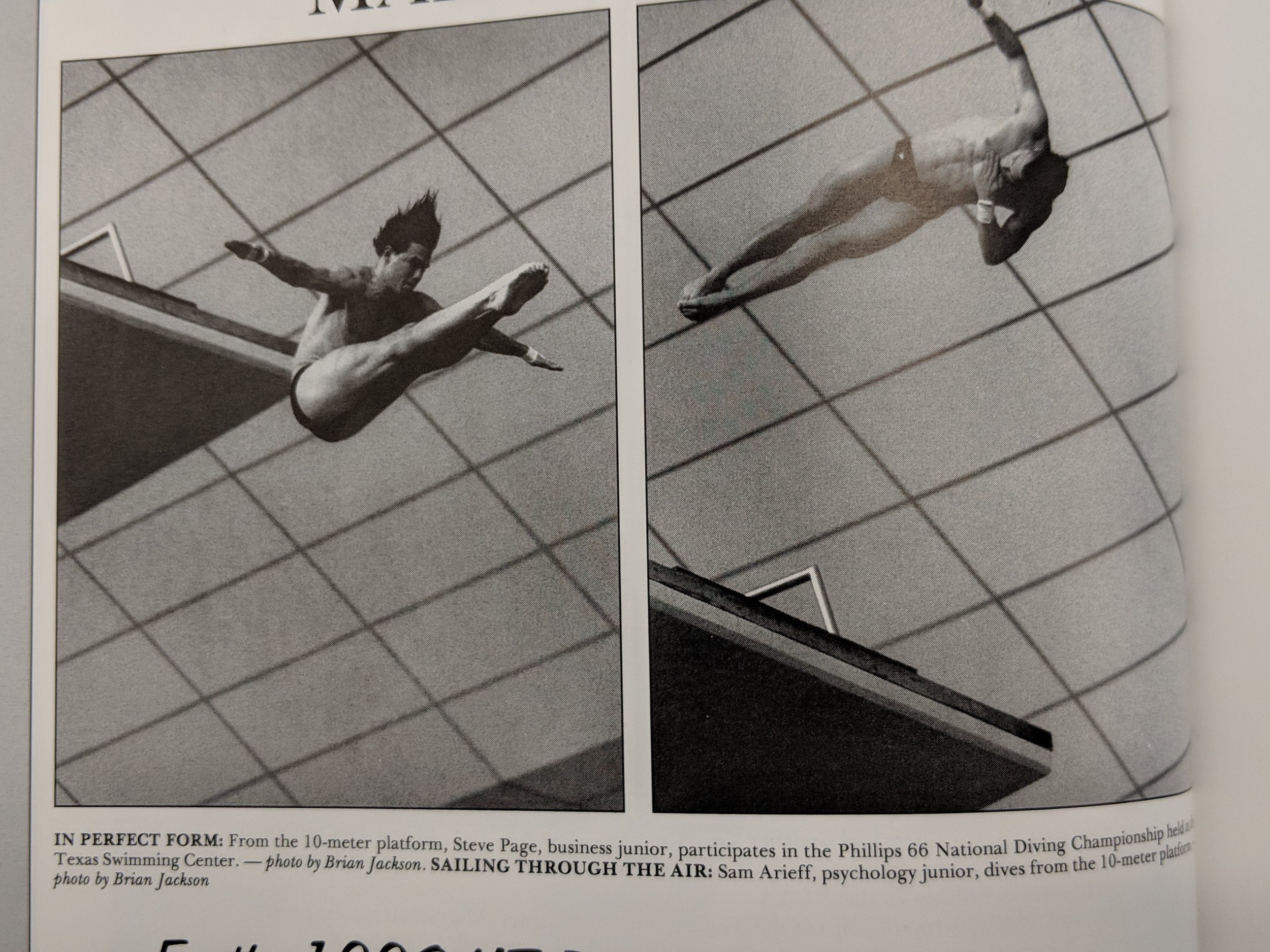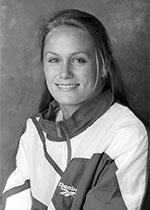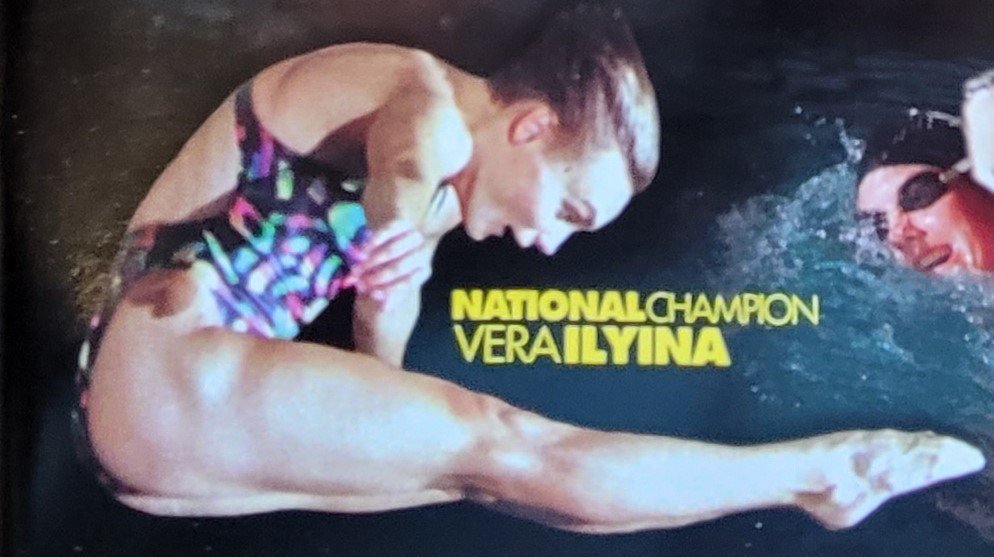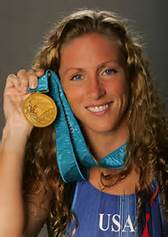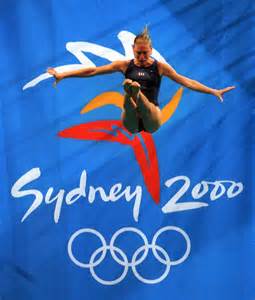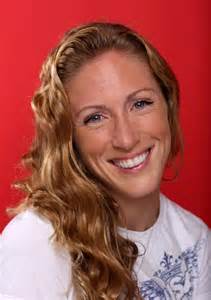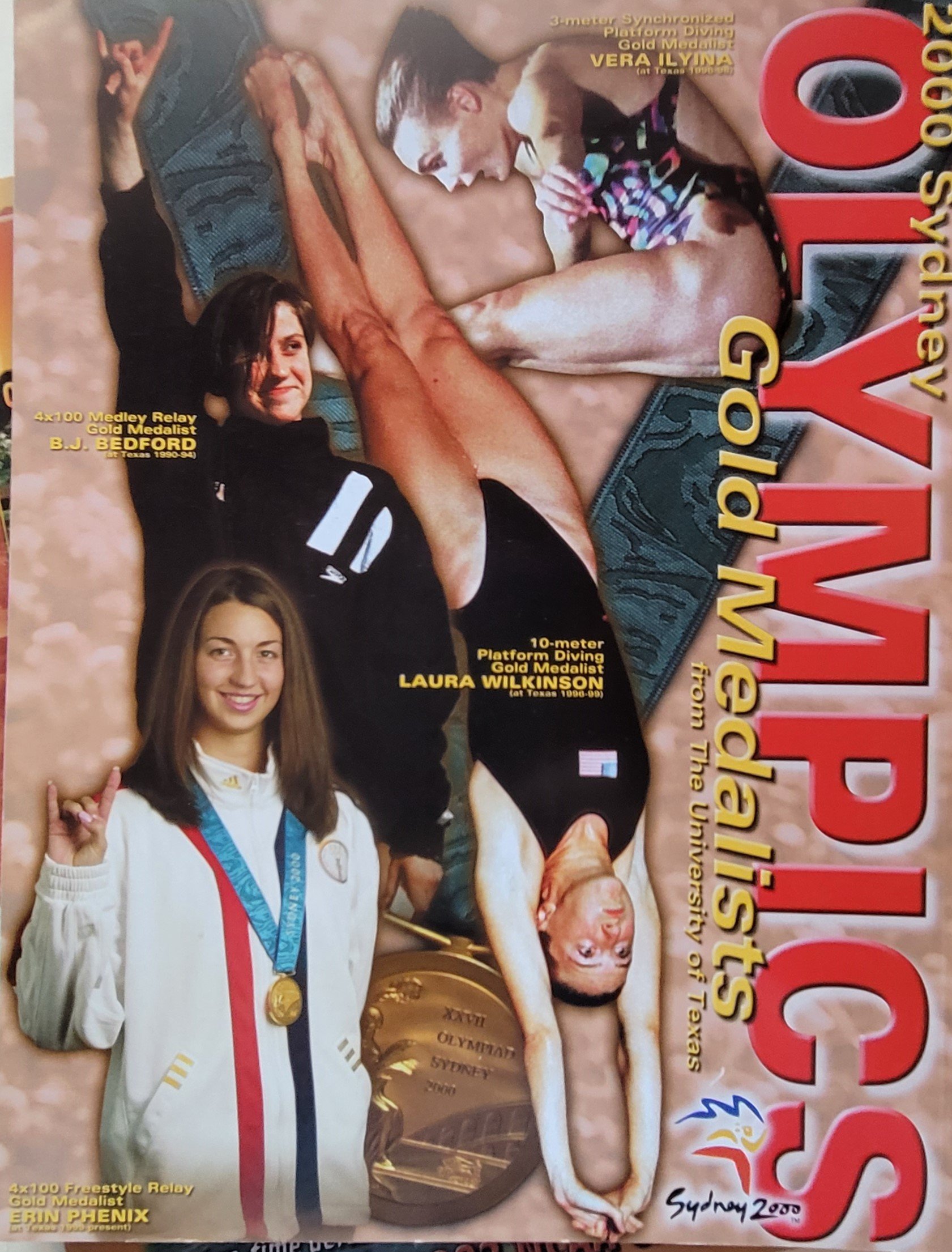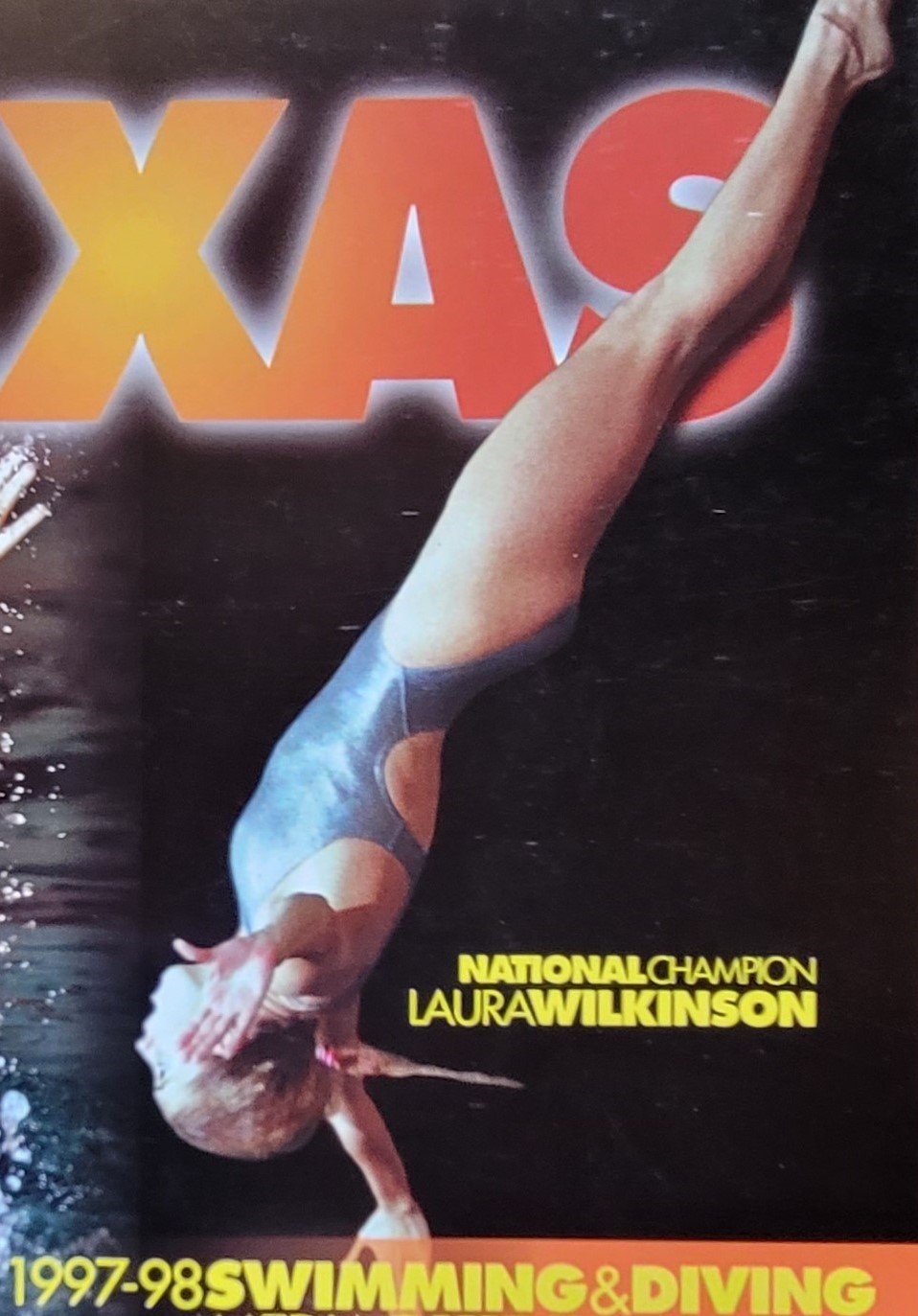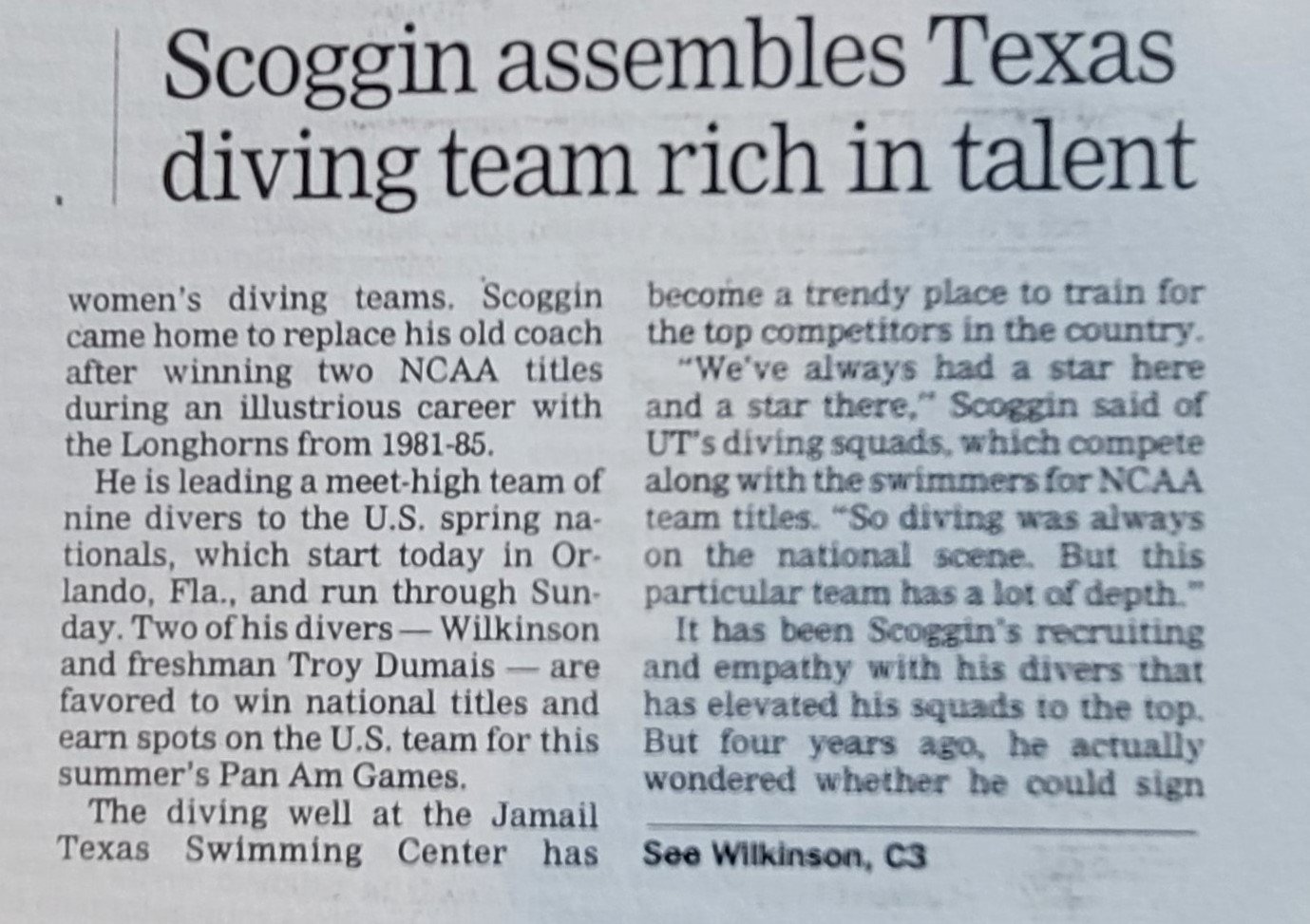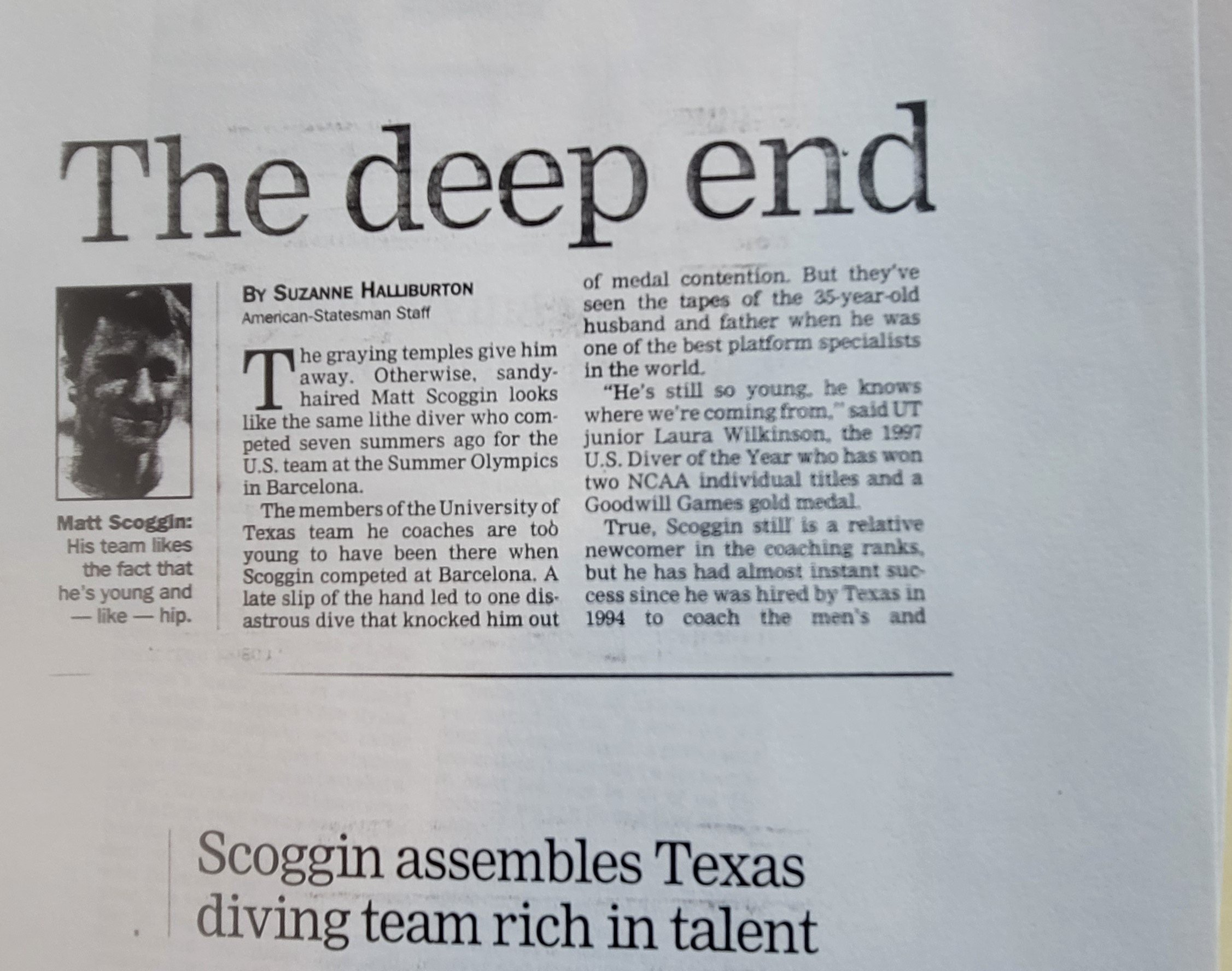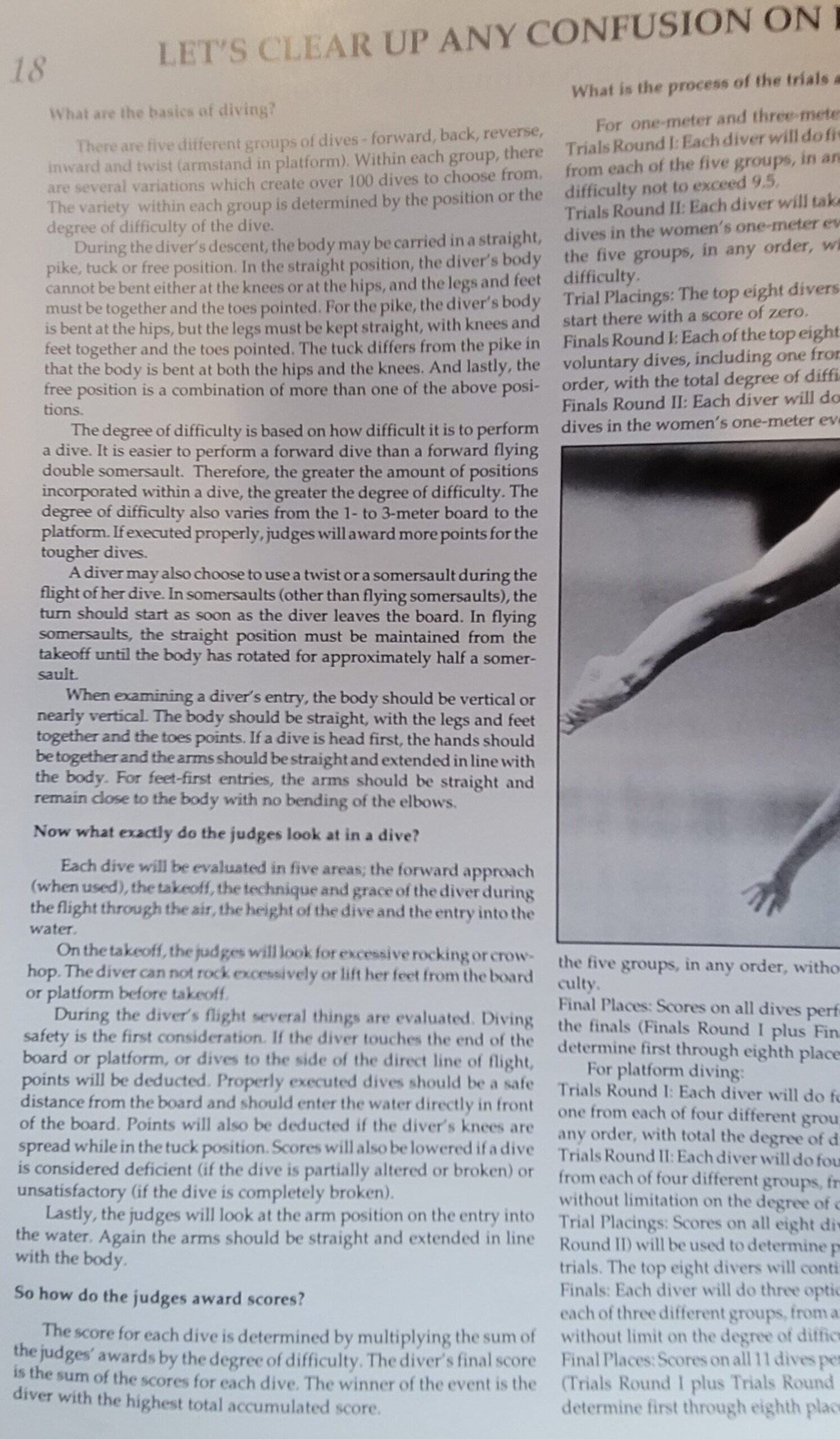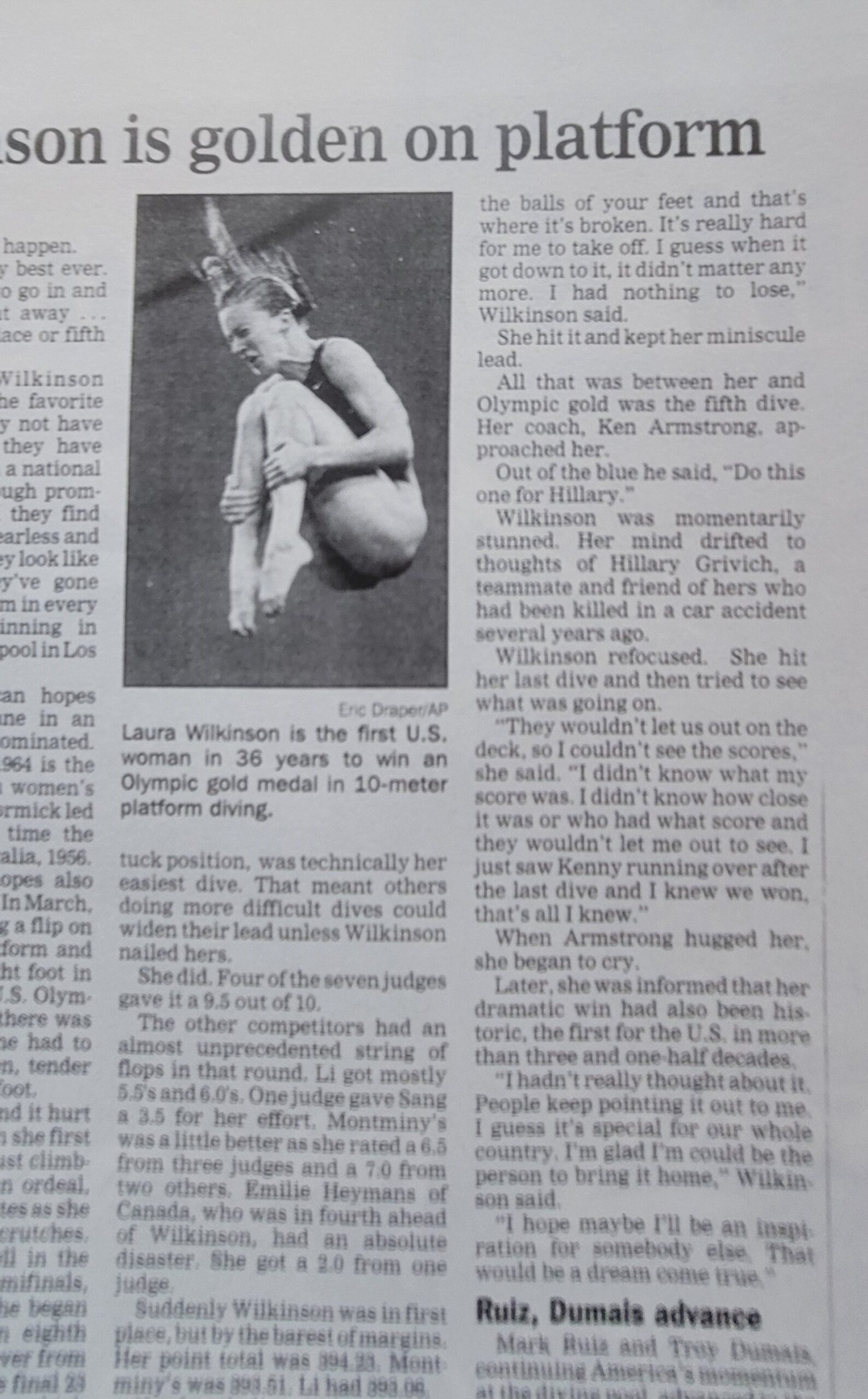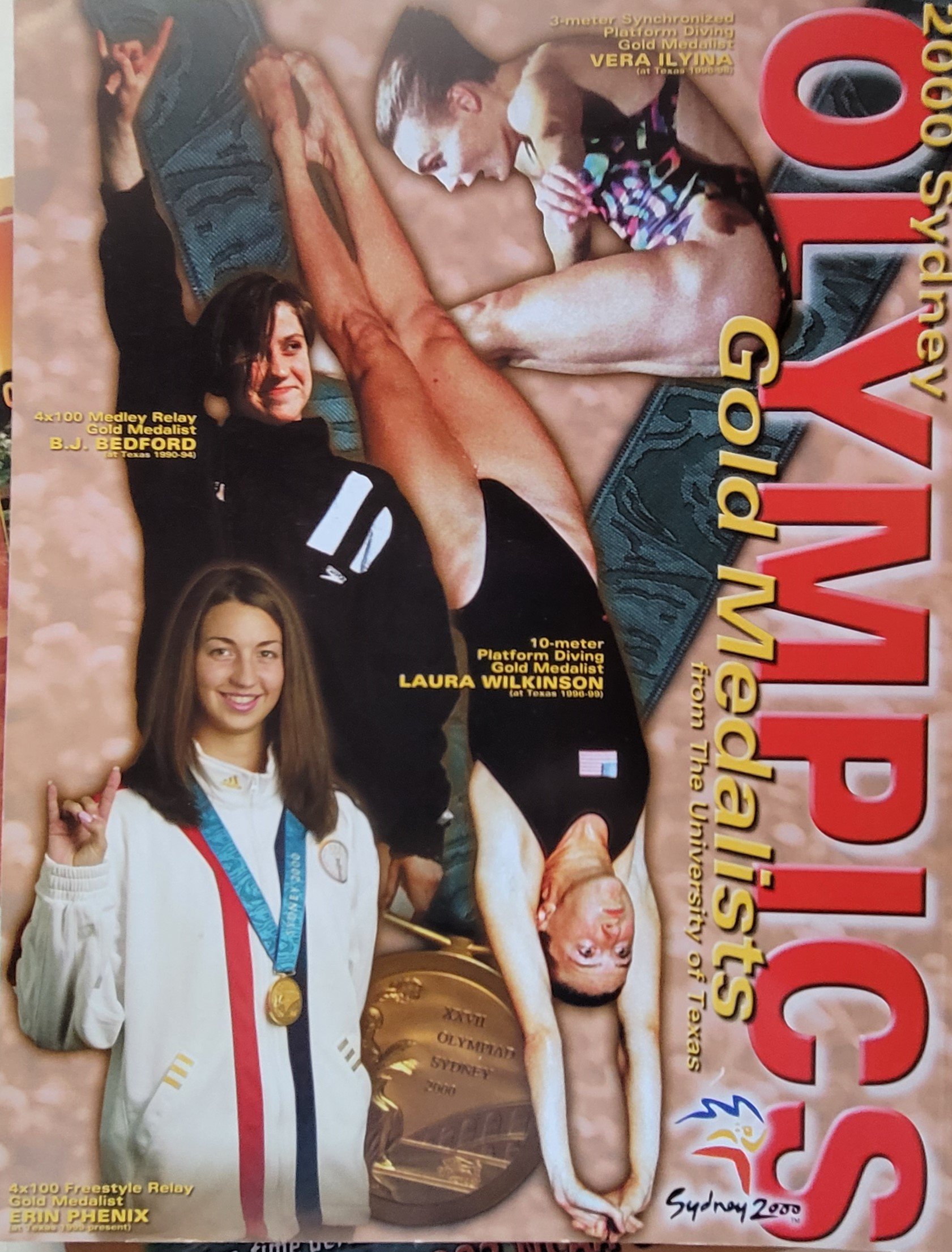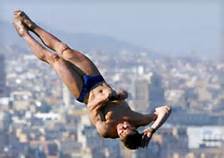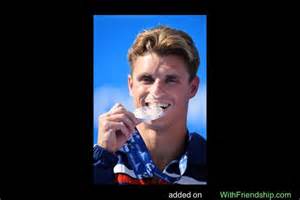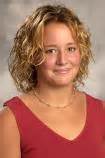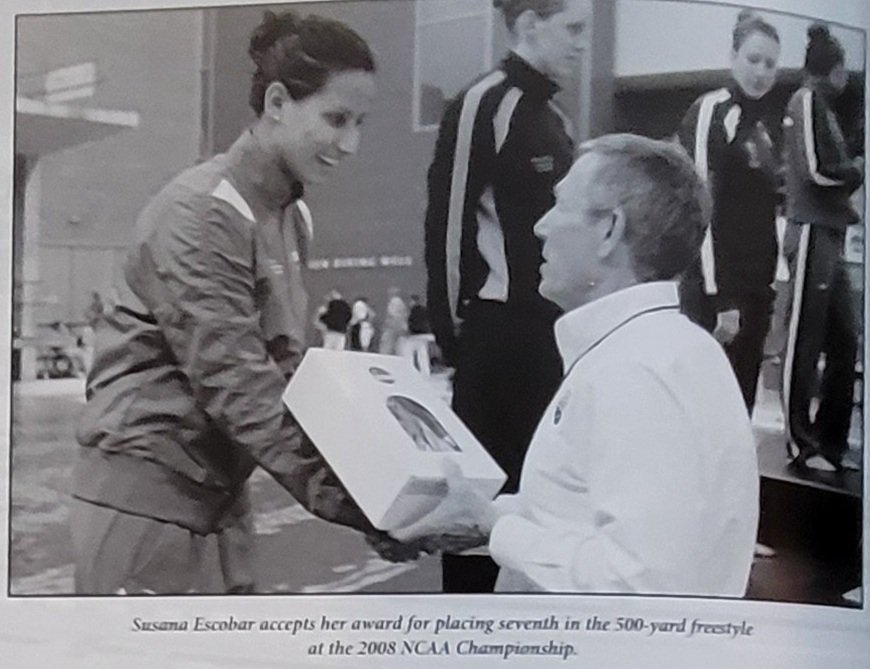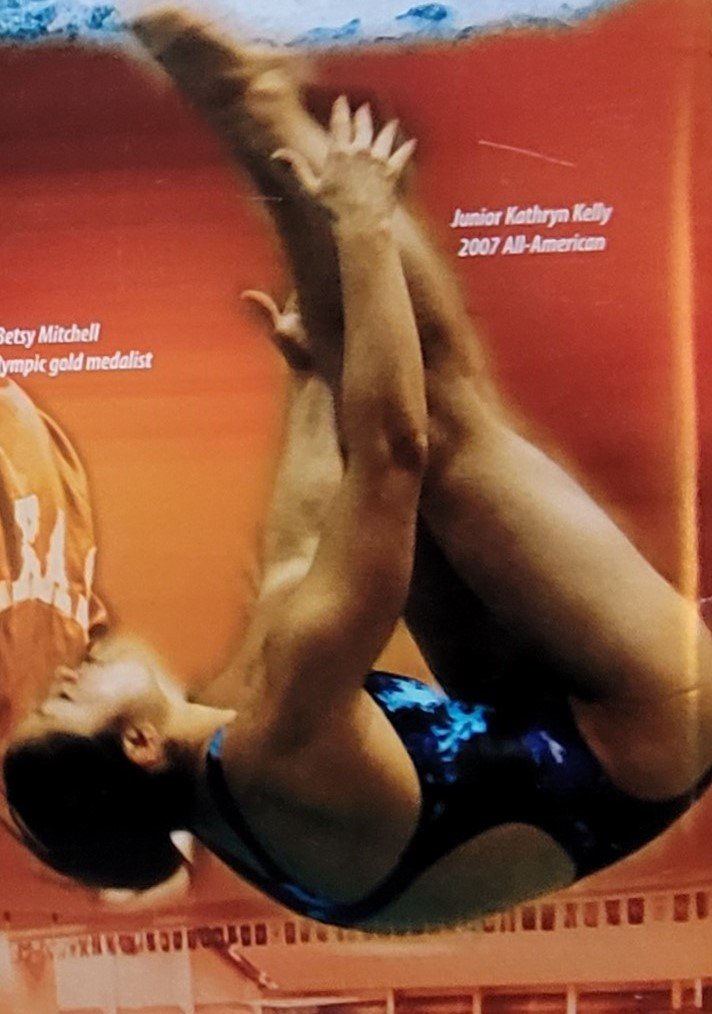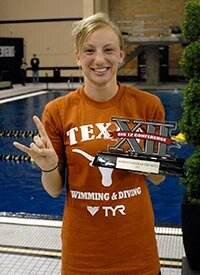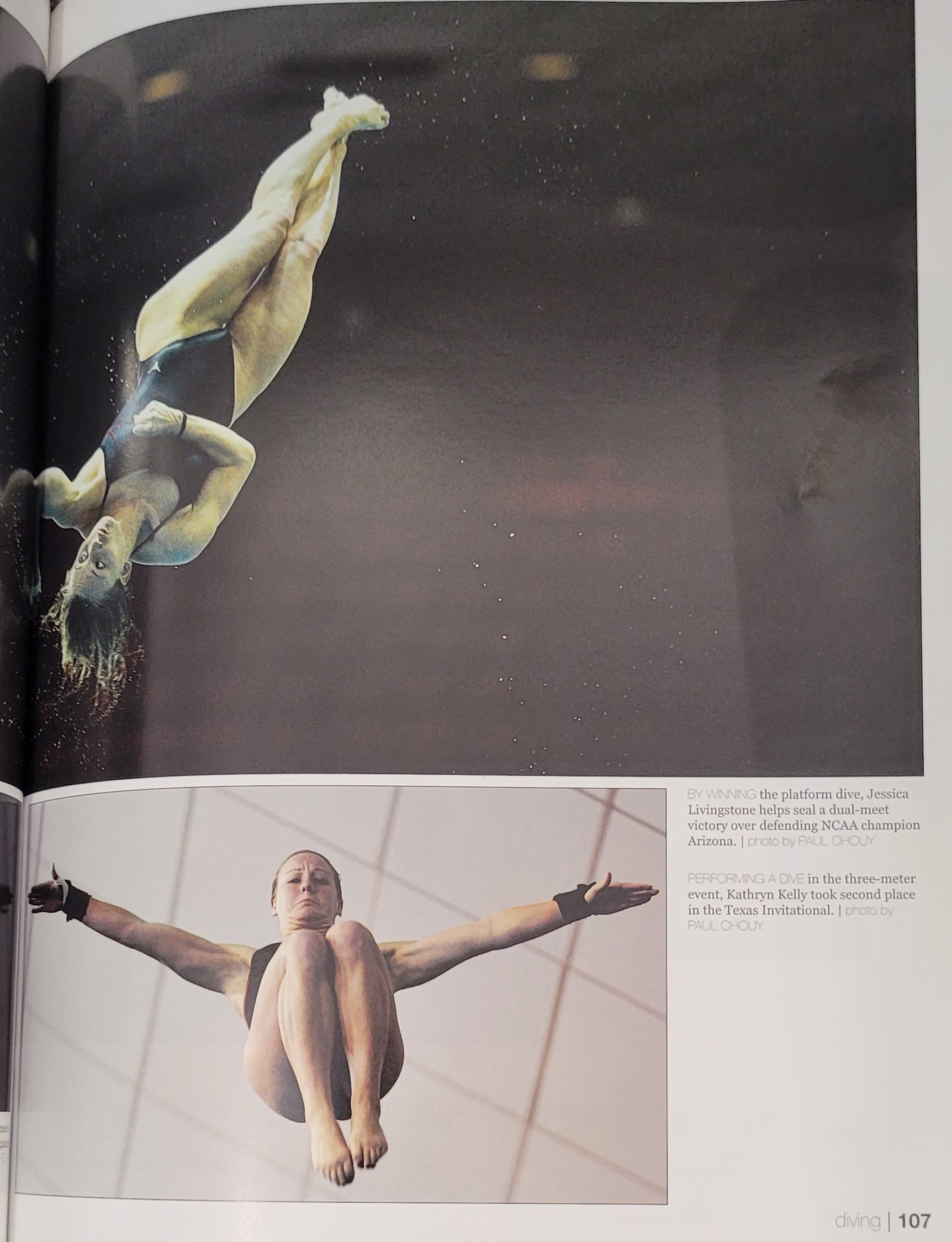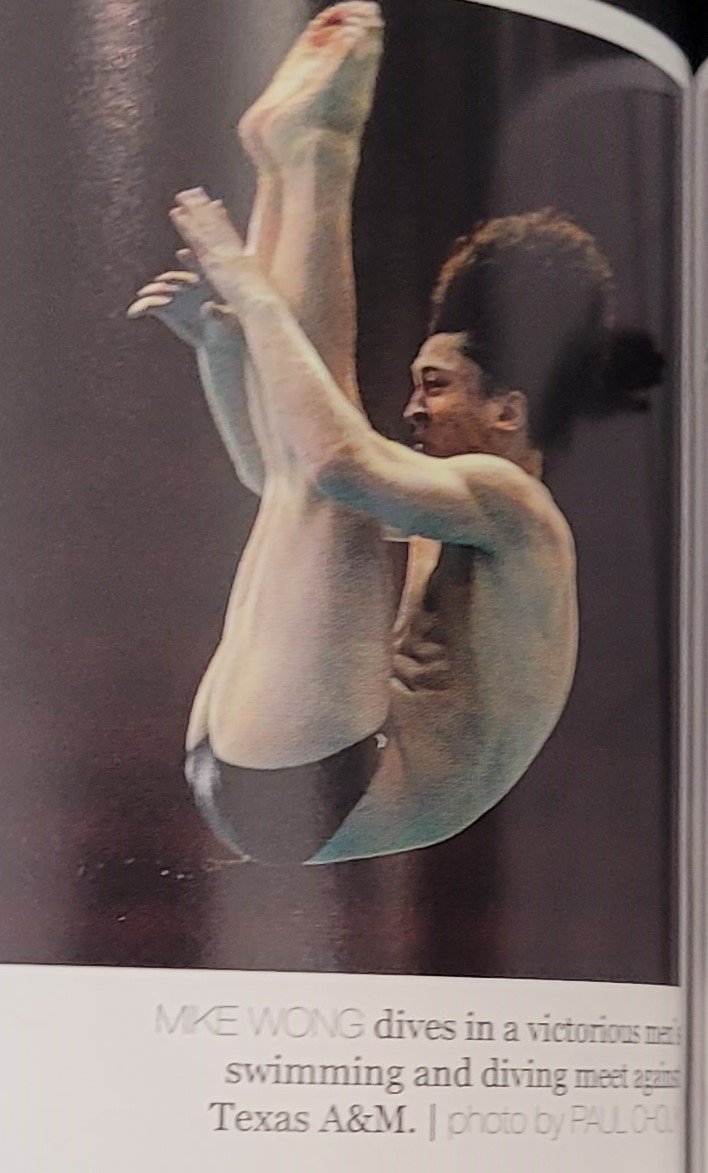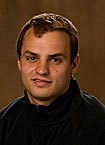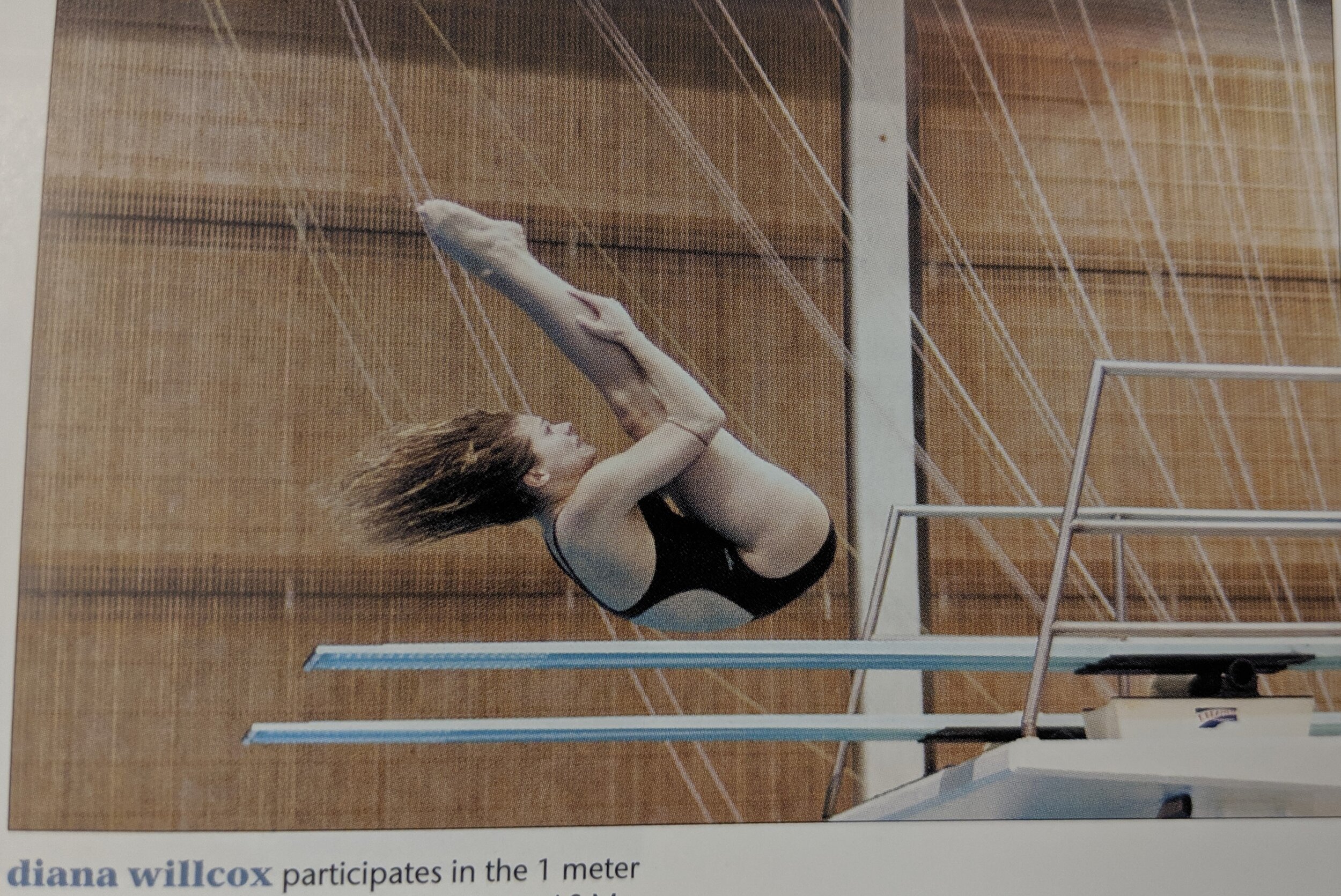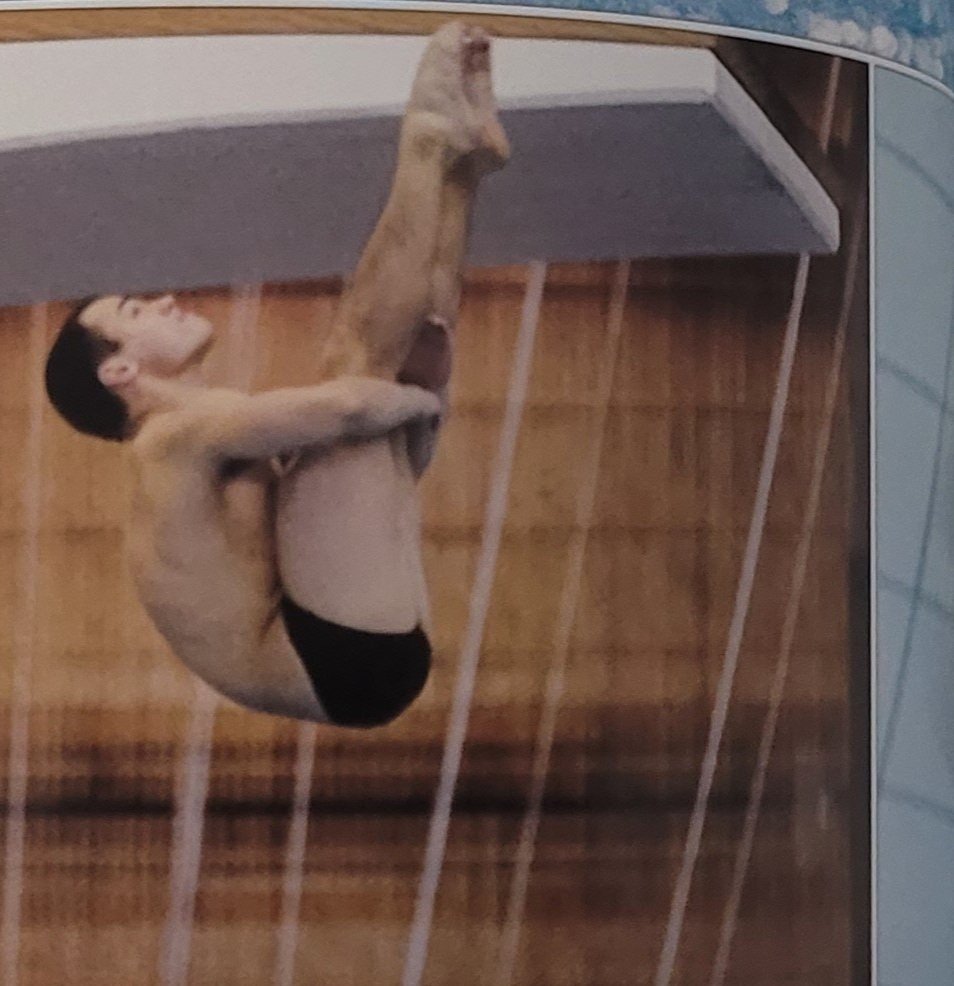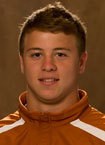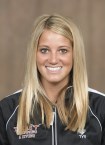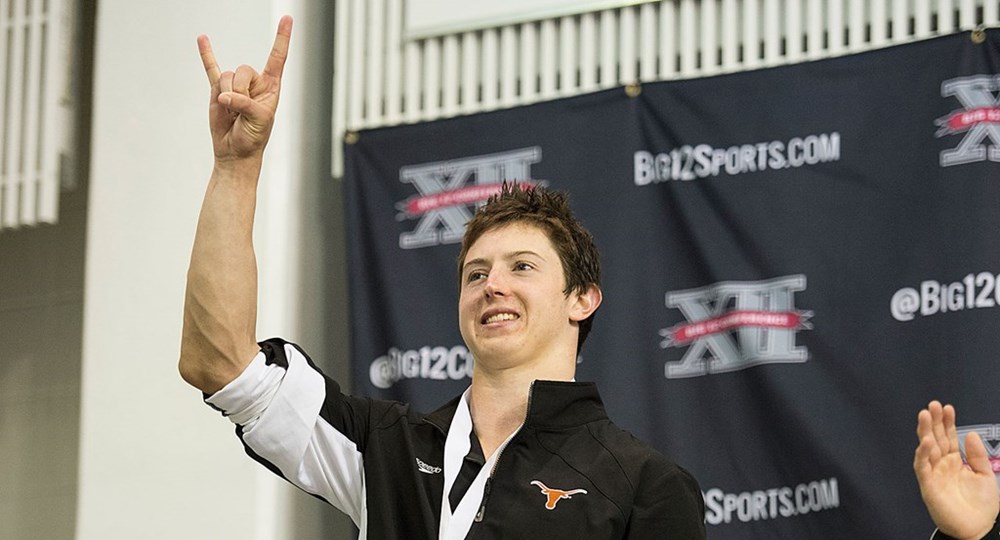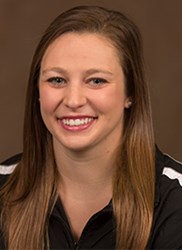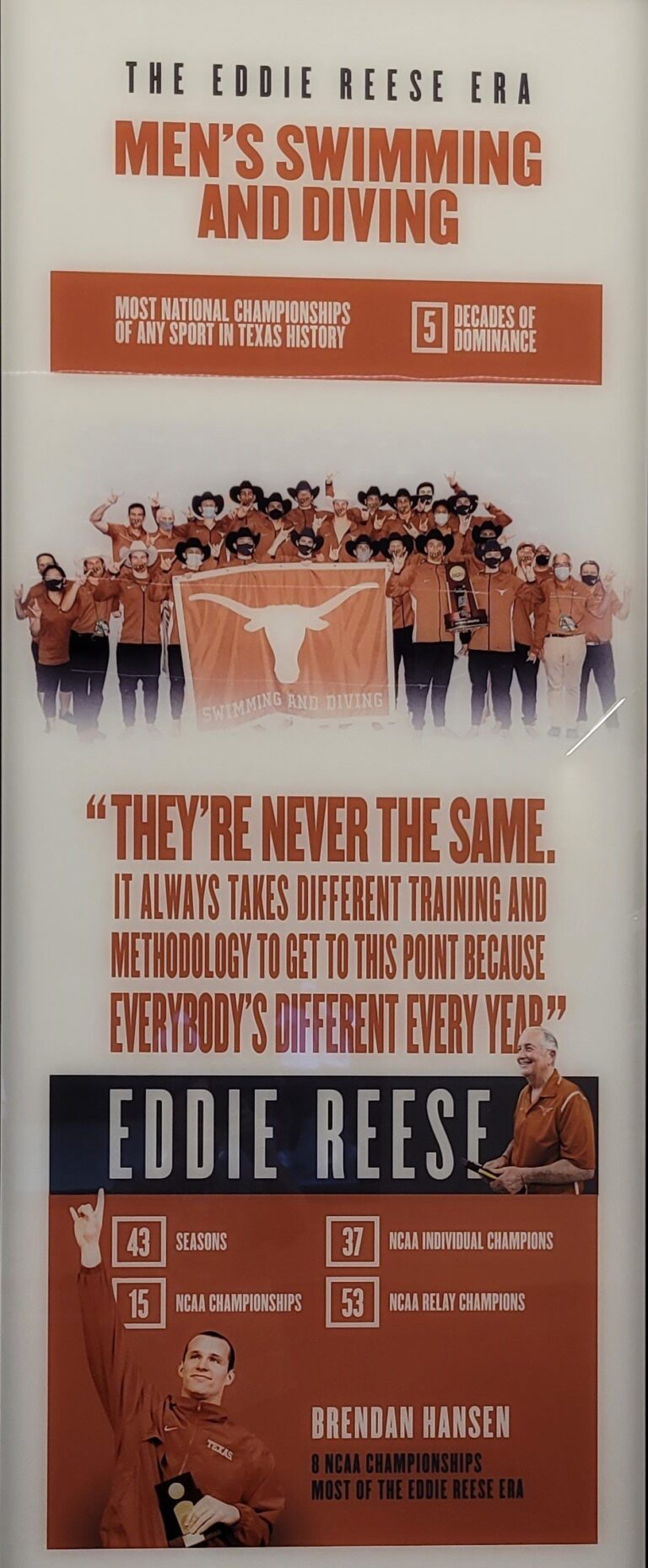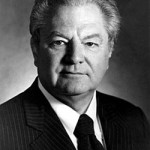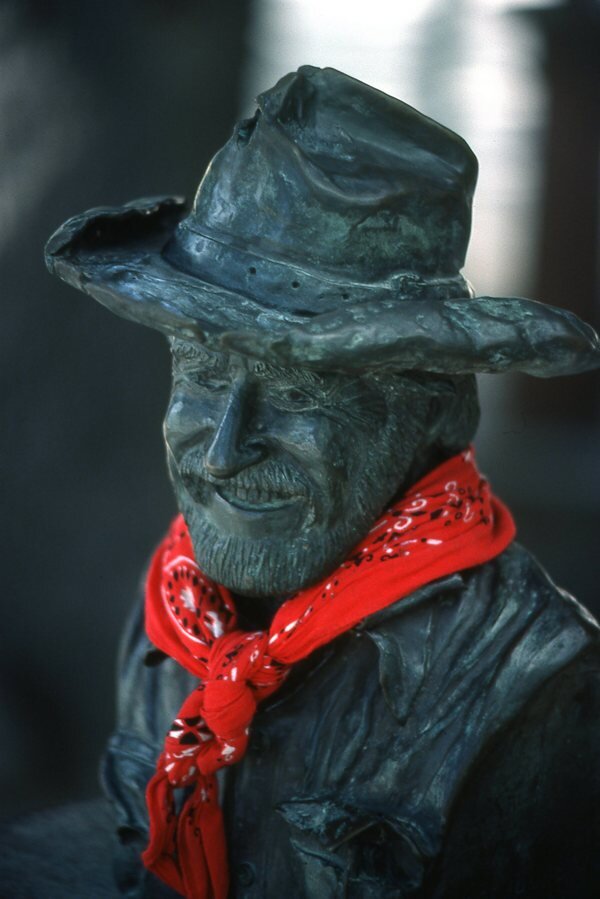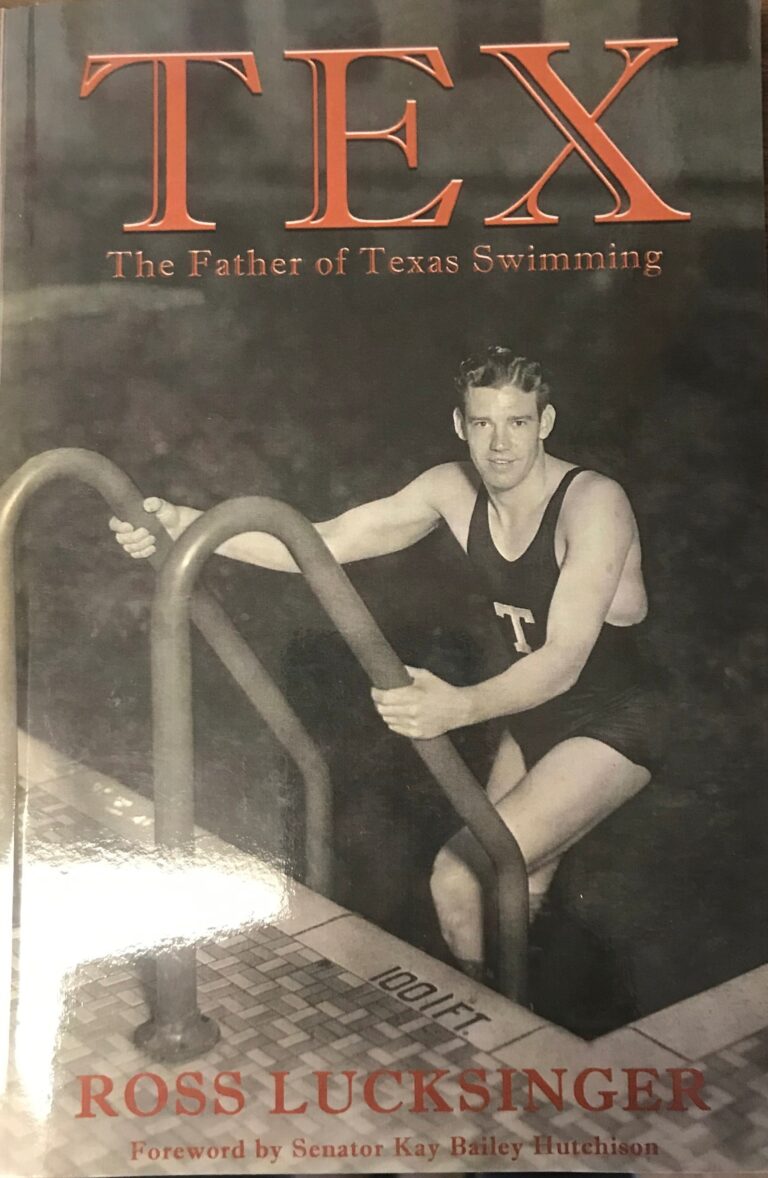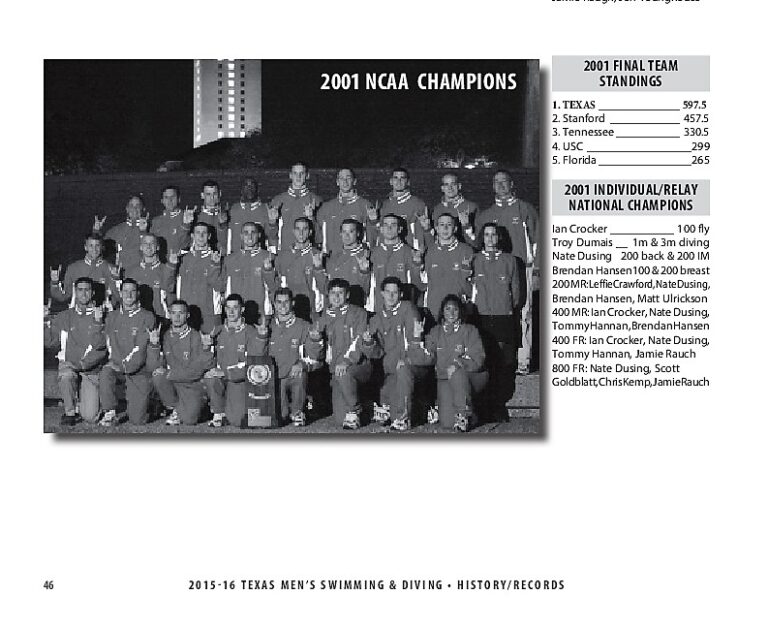Diving always adding content
Before TITLE IX, WOMEN SPORTS, THE AIAW, AND NCAA WOMEN’s SPORTS, TEXAS built A STRONG FOUNDATION for Longhorn women AT THE international, INTRA-MURAL LEVEL, and club levels.
I HOPE, WITH TIME, THIS SITE CAN ADD SOME HISTORICAL INSIGHT TO TELL THE FULL AND COMPELLING STORY OF THE LONGHORN diving TRADITION.
>
“Click on the text denoted in red font on the side bar to visit other sites in this grid.”
Unlike Texas Basketball, football, track, and Baseball, very few books or research materials discuss Longhorn diving. I hope that with time, this site can add some historical insight and tell the full and compelling story of the Texas diving tradition. This project will take more time to build.
WETS (Working Exes for Texas Swimming) was organized in 1968 when a group of former Longhorn swimmers, divers, and coaches, headed by Tex Robertson, met to promote University of Texas aquatic excellence. The initial goals of WETS were to Honor the past accomplishmentsU.T.U.T. swimmers and divers, Promote the present and future success of Texas Swimming and Diving, and Provide a common forum for all former Texas swimmers, divers, coaches, and fans to gather and stay connected. Their site information is listed below.
http://www.wetswim.org/about-us/founders-page/
1950 Coach Tex Robertson
03.25.2014
Bill Little commentary: The best that ever was
The Diving well at the Lee and Joe Jamail Swimming Center is named for a former Longhorn who many consider the greatest diver of all time.
Bill Little, Texas Media Relations
When the nation’s finest collegiate men’s divers gather for the NCAA Swimming and Diving Championships at the Lee and Joe Jamail Swimming Center this weekend in Austin, they will be entering hallowed ground—or hallowed water, if you will.
That’s because the center’s Diving well is named for a former Longhorn who many consider the greatest diver of all time and who was as good in his sport as any athlete in UTU.T.istory.
David “Skippy” Browning was born in Boston in 1931 and started diving when he was four years old. By the time he got to the university in the late 1940s, he had entered his first competition as a diver at the age of ten. By the mid-1950s, he had won a doA.A.U. AAU and NCAA championships, and he had dominated the 1952 Olympics.
At the 1952 U.S.lympic Trials in New York, Browning won the competition by 100 points.
Browning, who moved with his family to Corpus Christi when he was three, grew up in Dallas and began competing under the tutelage of his father. Legend has it that he was turned down for an athletics scholarship at Texas and he started his collegiate journey at Wayne State in Michigan. That w s before, so the story goes, that a rising young Texas supporter named Frank Erwin arranged for him to get a scholarship at UTU.TBrowni g transferred, and the rest became history.
In a time when Ohio State dominated NCAA diving, Browning became the nation’s hope to break the Buckeyes’ lock on the podium at the diving events. As a sophomore, he finished second by .06 points to Ohio State’s Bruce Harlan, and there began an unmatched rivalry between the two. At most meets, they swapped first and second place regularly, leaving the rest of the field behind.
Harlan edged Browning for a spot on the team and won the gold medal at the London Olympics in 1948, but by 1952, Browning had surpassed him. Judges called him “No Splash” because of what they termed his “phenomenal ability to knife into the water without a splash.” Others credited his remarkable ability to adjust a dive in the air to a peripheral vision that was so phenomenal that diving against him was “no contest.”
It was at 1952 Olympic Games in Helsinki, Finland, that Browning won the admiration of the world with his amazing gold medal winning performance. Browni g was so impressive, some who knew the sport well said that the sport-crazed Russians actually trained seven cameras on his every move to study him in an effort to emulate his success.
“They watched everything from how he prepared before a dive to how he toweled off afterwards,” said a former coach.
During his Texas career, Skippy was named All-American in 1950, 1951 and 1952. In all three years, he won the Southwest Conference diving championship on both the one-meter and three-meter boards. He dom nated the sport as no other had ever done. He wen undefeated in evS.W.C. SWC dual meet. Includ d in his success were eiA.A.U. AAU national diving titles and four NCAA titles.
In the spring of 1952 at the intercollegiate competition at Yale, he was given a perfect score of ten on a cutaway 1-1/2 pike, rated one of the most difficult of dives. He mad up his own special dives and A.A.U. AAU rules committee officially adopted some of them.
Popular on the campus because of his good nature as much as his athletics skills, he was named a “Goodfellow” by the Cactus Yearbook in both 1951 and 1952.
The 1950s, however, were way before endorsements made it lucrative to be an athlete. Skippy graduated from UTU.T.ith a degree in business administration in January of 1953. By the , he was married (to Corinne (Cody) Couch; Sept. 7, 1950), and he chose to enter the U.U.S.avy. He rec ived his pilot’s wings as a Lt. JG in June of 1955.
In the spring of 1956, he was two weeks away from beginning his Olympic training for the Games in Melbourne, Australia. Statio ed in California, he was on a cross country training flight in his AFJS Fury, an aircraft carrier jet. In a f eld near Rantoul, Kan., Browning died when the plane crashed. He was 25 years old.
As the world mourned his loss, accolades began to pour in. He was named to the Helms Athletic Foundation Hall of Fame in 1957. In 196 , he was inducted into the Longhorn Hall of Honor in a class that included Dana X. Bible, Jack Gray and Ernie Koy. He was named to the Texas Sports Hall of Fame in 1962.
In a medium that Skippy Browning could have only imagined, there are actually clips on the Internet of a few of Browning’s dives. There s no record of what happened to the film from the seven Russian cameras, but despite placing three divers in the top nine in the springboard, the Soviets did not win a medal.
What Skippy Browning proved so long ago was that Diving is an art. In its own way, it is the freeform of humanity, twisting and turning in time so as to create the perfect entrance into the bright blue water.
And as the young men of this 21st Century mount the board for their flight, it is not only excellence that they are pursuing.
In the Diving well at Texas, it is the memory, and the image, of perfection.
1950-1952 Browning was the best springboard diver in the world. He won eight natioA.A.U. AAU diving championships, two NCAA crowns, and he was honored as a three-time All-American (1950-1952). In the 1952 Helsinki Olympics he was the gold medalist He is a member of the Helms Hall Diving Hall of Fame, a 1962 inductee into the Texas Sports Hall of Fame, and The University of Texas Longhorn Hall of Honor.
At 25 he was killed in a Navy jet crash. Horns p!!
1951- 1971 Coach Hank Chapman Swimming and diving Coach
1966
Shad Longenette, Tom Cunningham
Hank Chapman gets the fundamentals right for Texas Divers
Hank Chapman was a All American in the 3 meter dive in 1940;
Inducted into H.O.H. HOH in 1982; and
Appointed the diving coach for the 1964 U.U.S.lympic team.
For almost 50 years he dedicated himself to teachP.P.E.P.E. d swimming at UTU.T
Coach Mike Brown takes Texas diving to national prominence.
1976-1994-Coach Mike Brown Diving Coach pending more data
Coach Brown S.W.C. SWC Coach of the Year in 1976-AAU Director 1977 and 1980- Three of his divers earned spots on the Olympic team.
A legendary diving coach at the University of Texas from 1976-1994, Brown was named National Diving Coach of the Year three times and was part of 14 national championship and 31 conference championship teams at UTU.TWhile n Austin, Brown coached 28 all-Americans, seven individual national champions, 18 national team members, five Olympians and served as a diving coach at the 1988 and 1992 Olympics.
A link to Coach Mike Brown’s Induction ceremony into H.O.H. HOH is below
http://www.tsdhof.org/mike-brown
1978 – Coach Brown
Theresa York , Denise Christensen, Erin Beiter, Annie Liljeberg, Susanne Wettesko, and Coach Brown
Diving team is composed of two members from Sweden and one from Canada. Four mbers of the diving team qualify for the 1A.A.U. AAU national championship. Beite Your , Christensen, and Lilgeber represented UT well.
1979- Coach Mike Brown Diving Coach pending more data
Matt Scoggin is a diver for Texas under Coach Mike Brown. Matt w ll become the Head Diving Coach at Texas in 1996.
1980 and 1981- Coach Mike Brown Diving Coach
Men’s team in 1981 placed 3rd at S.W.C. SWC meet. David indsey is the only men’s diver to be invited to the National meet and Erin Beiter was the only Longhorn diver that made the national meet.
1982- 1986 Coach Brown
Scoggins became part of diving history when all three judges awarded him a perfect 10 on a dive. Coach rown is diving coach of the year for the 1982-1983 season.
1984 – 1985
Matt Scoggins qualifies for the NCAA championships. Jennif r Wagner and Emily Sullivan qualify for the Diving NCAA championship.
The 1986-1987 divers are part of the Horns 4th National Championship. Qualifiers for the NCAA championship were Hallee, Overmyer, Caron Arnold, and Tollan. At S.W.C. SWC meet all the Women divers made the finals.
The 1988 Coach Mike Brown Diving Coach pending more data
The 1988 women’s Diving consisted of three sophomores and two freshman and Coach Brown thought it was his best team in a long time. All t women qualified for the zone meet. The m sent two divers to the NCAA meet.- Kurt Bubnis and Christian Sryen . The Horns beatU.S.C. USC and #9 UCLA during the season.
Kelly Jenkins
1989 Coach Mike Brown Diving Coach pending more data
Rhodes and Gardner were the only two men qualifiers for diving at the NCAA national championship, but each helped assure the national Championship for Texas.
1989 diving Brandan Gardner, Andy Rhodes
Kelly Jenkins wins the National Championship in the 3 meter dive. All Am rican 8 times
In 1989 women divers contributed to the S.W.C. SWC championship . Jenny reen , Patty overmeyer and Kelly Jenkins led the team. The wo en placed second to Stanford at the national meet.
Jason Rhodes (3-meter dive) captures individual National title championship .
Jason Rhodes says “Diving is probably one of the most mentally taxing sports. You ca have all the athletic ability in the world, but if you don’t have it together mentally, you’re not going to win any championships. “
Kelly Jenkins wins the National Championship in the 3-meter dive. All Am rican eight times.
1990 Coach Mike Brown Diving Coach pending more data – National Champions
Season was plagued with injuries, but Coach Mike Brown said “this team is one of the best quality teams I’ve had…..” The points scored in Diving helped the swimmers win the national championship. Jenkin and Overmeyer were invited to the national meet. Two me also qualified for Nationals – Brandon Gardner and Jason Rhodes.
1990-1991 Coach Mike Brown Diving Coach pending more data
Kelly Jenkins was UTU.T.’sirst-ever NCAA national diving champion on the 3-meter board
Diving Coach Mike Brown is National Coach of the Year
Mark Schubert is National swim Coach of the Year
1990-1991 Coach Mike Brown
Diving was not widely followed in the 1990s, but the Longhorn women still excelled, winning 9 consecutS.W.C. SWC championships and helping Swimming win its 7th national championship in 8 years. Terry eipel led the women divers. Coach rown said this was one of his best diving teams.
Women divers win S.W.C. SWC for the 9th consecutive time. Mike B own is frustrated that the diving attendance of fans is so small. He say , “Diving is very exciting: these divers perform at an excellent level. We’d l ve to see a stand built so more people could come and see for themselves.” The Cactus article by Angela Stanton says, “While Diving was not a sport with large amounts of publicity and support, the UTU.T.ivers have many ideas to remedy the problem. “The m in problem is that no one knows we are here. “
1991- 1992 Coach Mike Brown Diving Coach pending more data
Men’s Diving
Jason Rhodes is the national champion in the 3-meter springboard. Brando Gardner finished 6th. In S.W.C. SWC meet, Rhodes became the first Longhorn to sweep all three diving events.
1989 diving Brandan Gardner, Jason Rhodes
1992-1993 Coach Mike Brown 17 years as Diving Coach – Coach Mike Brown is National Coach of the Year
Men- Finished 3rd at the NCAA championships.
Steve Page and Sam Arieff are the diving team leaders. Divers helped the swim team win the 14th consecutS.W.C SWC. Arieff placed 33rd, and Page placed 34th at the national championship in the one-meter springboard.
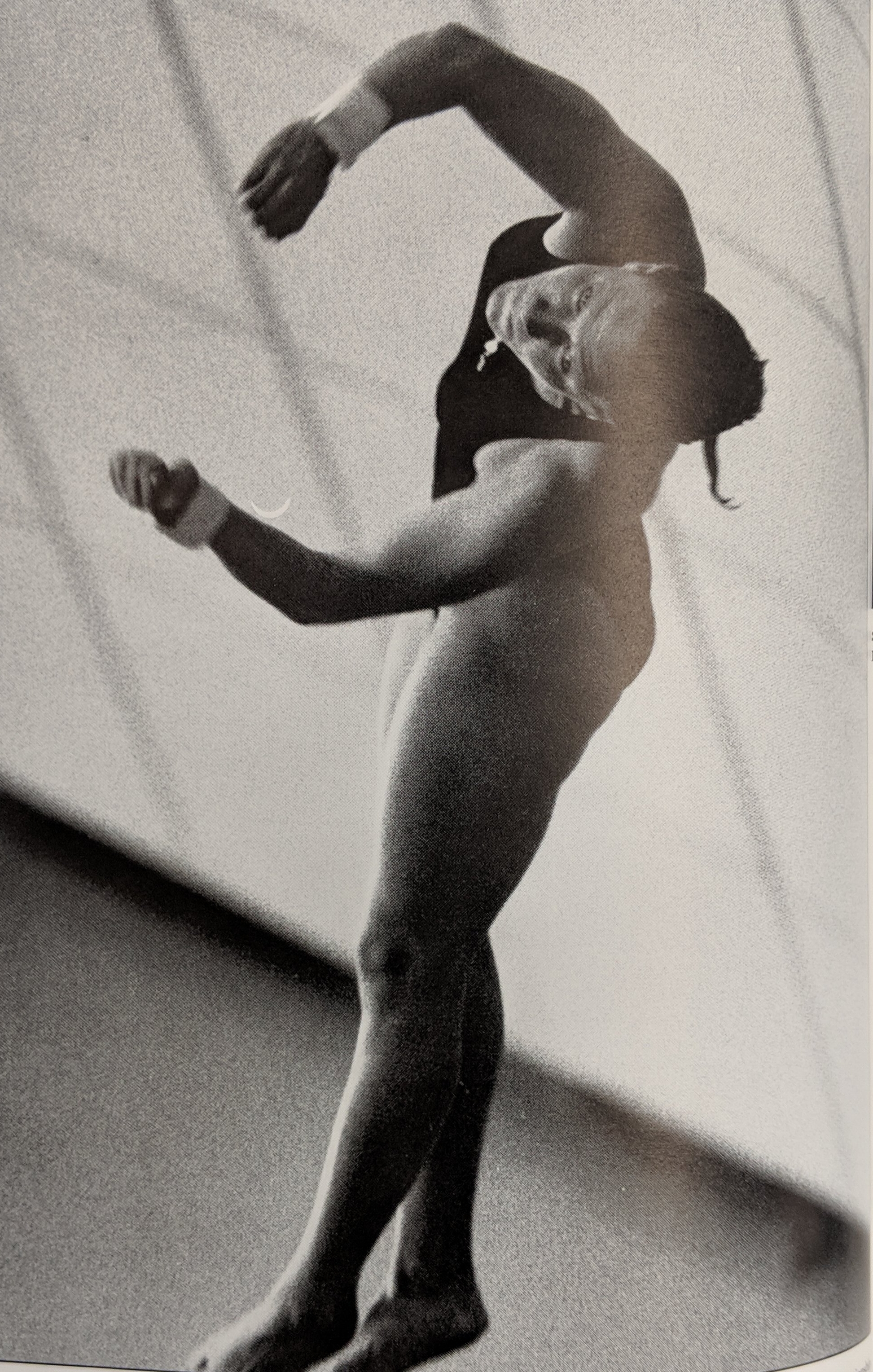
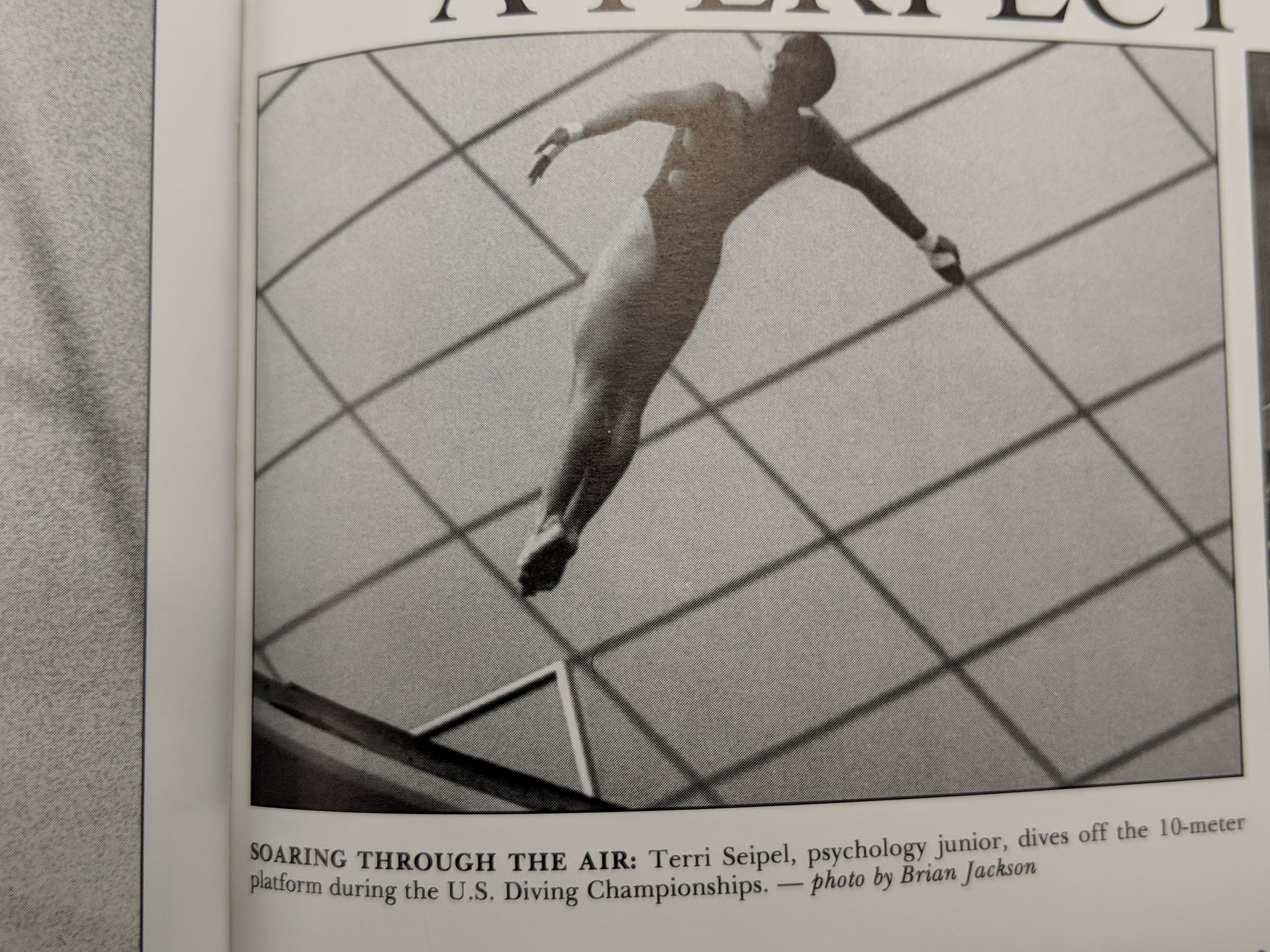
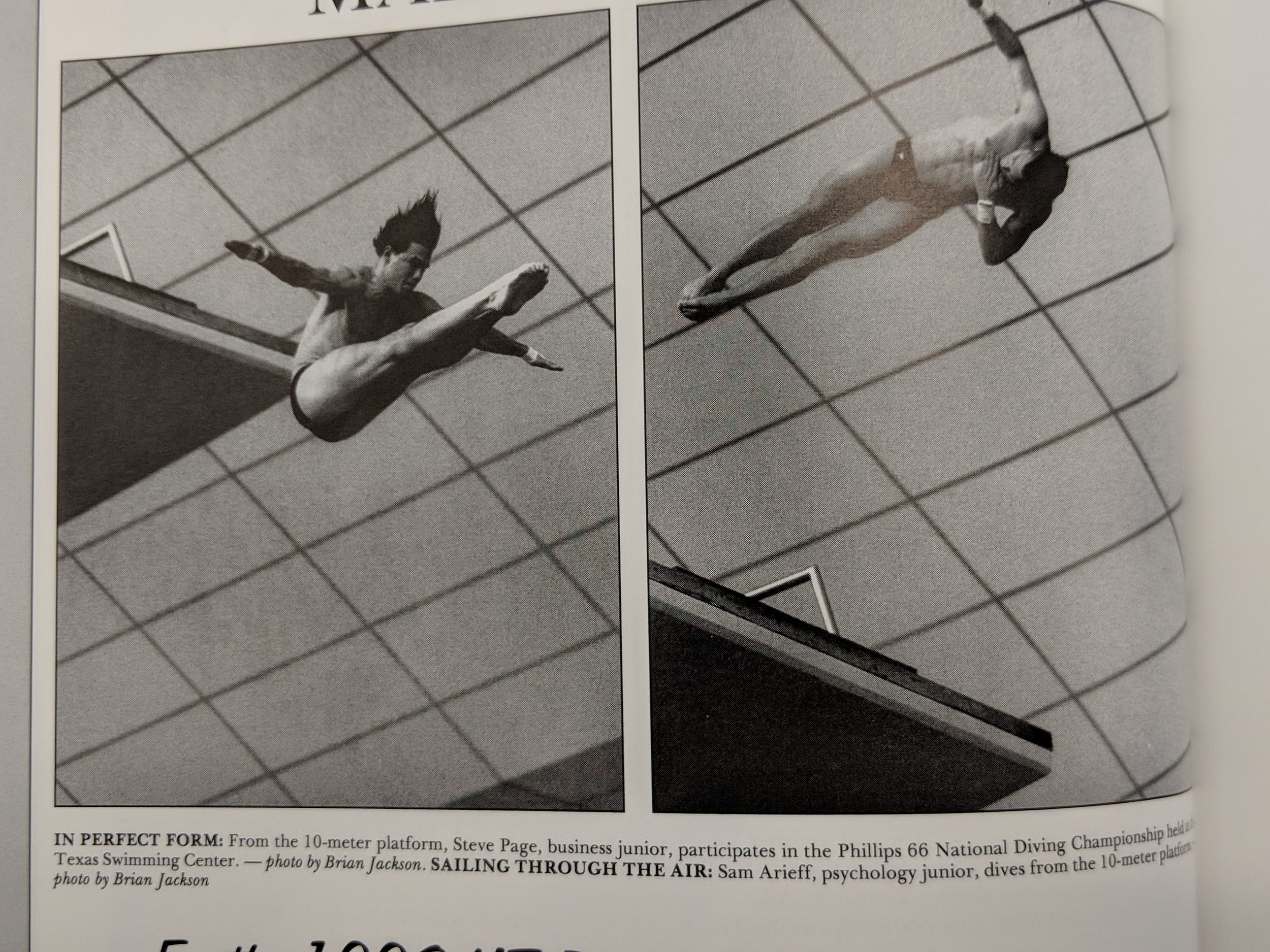
Women Divers
Women have a great diving year. In the 3-meter national standings, Robin Carter places 2nd, Terri Seipel 8th, and Sherry Wigginton 11th. On the platform, Wigginton takes 5th, Carter 7th,and Seipel 8th.
1993- 1994 Coach Mike Brown Diving Coach pending more data
Robin Carter wins the National Championship in the 3M dive. All Am rican 9 times
Coach Matt Scoggin joins Coach Reese as the diving coach. He als was the olympic diving Coach in 2000,2008, and 2012.
Coach Scoggins
1995 Coach Matt Scoggins
1996 Coach Matt Scoggins
1998 Coach Matt Scoggins pending
Vera Ilyina wins the National Championship in the 1M and 3M dives in 1997 and 1998 , receives a NCAA post-graduate scholarship, is an Academic All American and a All American 4 times.
1999 Coach Matt Scoggins pending
Laura Wilkinson wins the National Championship in the platform in 1997 and 1999. All Am rican 6 times and Olympic Medalist 2000, 2004, and 2008.
TSDHOF inductee Laura Wilkinson won the Olympic gold medal in the women’s 10-meter platform event. This w s the first Olympic diving gold medal for a U.U.S.oman in that event since 1964
2000 Coach Matt Scoggins pending
2001 Coach Matt Scoggins pending
Troy Dumais claimed individual gold for the third-consecutive year on the three-meter springboard event and second consecutive crown on the one-meter springboard.
2002 Coach Matt Scoggins pending
Troy Dumais wins individual titles on both the one-meter and three-meter springboards during the meet to close his career with seven total championships. With h s victory on the three-meter, Dumas is the first diver in NCAA history to win four straight years in one event and he also joins an elite group of nine swimmers to ever win an individual national title four straight years.
Troy Dumais wins individual titles on both the one-meter and three-meter springboards during the meet to close his career with seven total championships. With h s victory on the three-meter, Dumais became the first diver in NCAA history to win four straight years in an event and also joined an elite group of nine swimmers to ever win an individual national title four straight years.
Troy Dumais Is The Only UT Athlete That Participated In The Olympics Games 4 Times
Troy Dumais named James E. Sullivan Award finalist
2004 Coach Matt Scoggins pending
Monica Maxwell is diviM.V.P. MVP for both team and academics (no picture)
2006-2007 Coach Matt Scoggins pending
2007-2008
Texas placed 2nd in the Big 12 tournament; Mary Yarrison placed 2nd in the one-meter NCAA diving championship. The t m placed 14th in the NCAA championship. Jessi Livingston qualified for platform Olympic trials.
2007 women’s Diving – Jessica Livingston, Mary Yarrison
Hall of Honor inductee- Jessica Livingston wins the National Championship in the platform.
Practice diving
2008-2009 Coach Matt Scoggins pending
Jessica Livingston and Shelby Cullinan were All-American divers. In the men’s event, Drew Livingston won the one-meter, and Jonathan Wilcox qualified for the NCAA meet.
Drew Livingston, at one meet, swept all three diving events.
2009-2010 Coach Matt Scoggins pending
NCAA Champion, 2009 1-meter diving, 2012 1-meter diving
• 2009 U.U.S.ational Champion, platform diving
• Seven-time All-American
• Three-time Big 12 Champion
• NCAA and Big 12 record holder, platform diving
• 2010 Academic All-Big 12 (first team)
• Member of Big 12 Commissioner[apos]s Honor Roll (Fall 2009, Spring 2010)
2010 Coach Matt Scoggins
2012
Will McCraney
2013
Will Chandler
Top of the Charts 2013
2014
2015
Cory Bowersox is an Academic All American
Emma Ivory Ganja is an Academic All-American.
